UNDER THE DOME
Bank Leaders
Deliver
Testimony
AGRI-LENDING Farmers are Facing Financial Challenges


UNDER THE DOME
Bank Leaders
Deliver
Testimony
AGRI-LENDING Farmers are Facing Financial Challenges


THE STATE’S D.C. DELEGATION LEADS CONGRESS
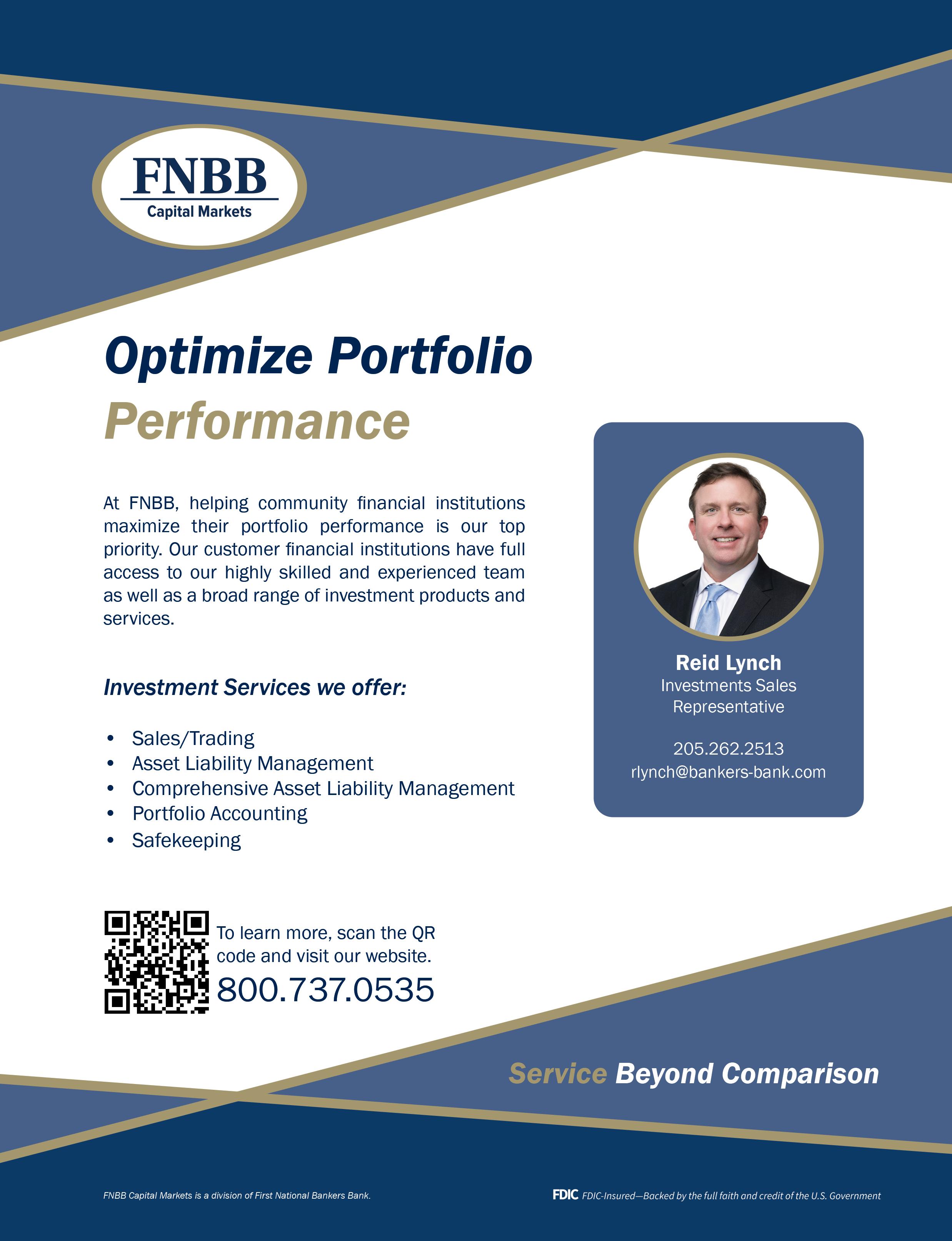
ARKANSAS BANKERS ASSOCIATION STAFF
President/CEO
Lorrie Trogden
VP/Controller
Carla Brinkley
VP/Professional Development
Kami T. Coleman
Office Manager
Peggy Hooper
Fundraising and Member
Services Associate
Whitney Horton
Administrative
Support Specialist
Abi Johnson
EDITORIAL STAFF
Editor Roby Brock
Creative Director / Designer
Ashlee Nobel Lee Lee Arts + Design
Contributing Writers
Ian Bryan, Brad Chambless, Susannah Marshall, Rob Nichols, Jeff Peden, and Tim Schenk
The Arkansas Banker (ISSN 004-1726) is published quarterly by the Arkansas Bankers Association, 1220 West Third Street, Little Rock, AR 72201. Phone: 501.376.3741. Periodical postage paid at Little Rock, AR. Postmaster: Send address changes to Arkansas Bankers Association, 1220 West Third Street, Little Rock, AR 72201. Subscription to The Arkansas Banker magazine is included in the membership fees to the Arkansas Bankers Association. Cover price is $5.95 each. Annual subscription rates are $40.00 for members and $60.00 for non-members.
Federal tax law prohibits the deduction of lobbying expenses for federal incomes tax purposes. Organizations like ABA, which assess member dues, are required by law to notify their members of the portion of their dues attributable to lobbing/and therefore non-deductible on your federal tax return. For the year 2024, it is estimated that 9.91% of your dues will be attributable to lobbing as defined by the IRS. Contributions to ABA are not charitable contributions, however, they may be deductible as a legitimate business expense.
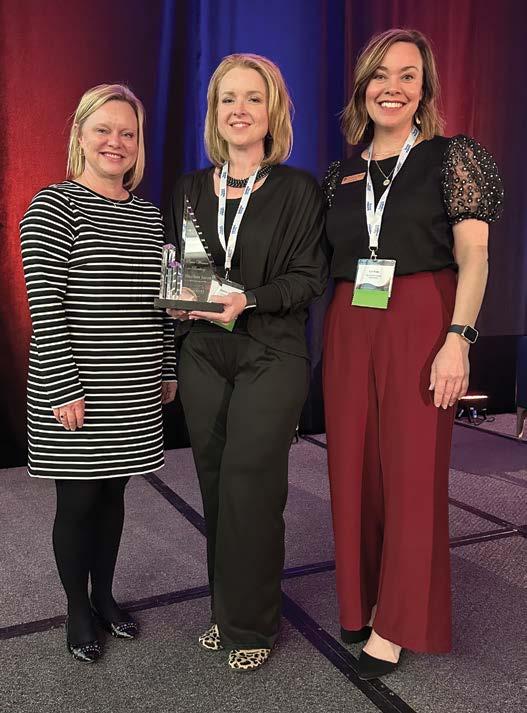



Lending
Uncertain agri policy challenges lenders.
Bank Department Bills
State legislation moves this session.
Five Dollar Farce
The CFPB’s latest rule is bad for banking.
Leadership That Works
Cost-effective and practical leadership strategies. Women
Another successful leadership conference.
All
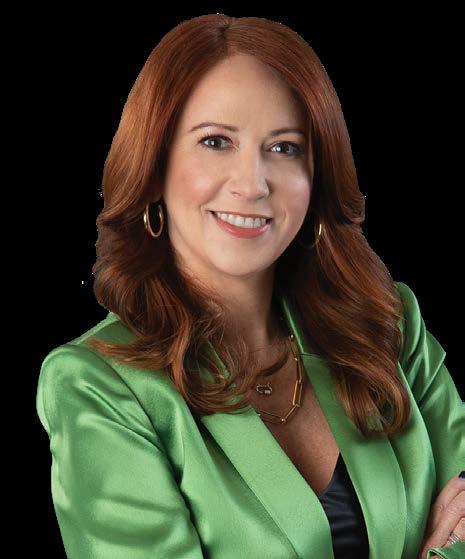
Lorrie Trogden | President & CEO | Arkansas Bankers Association
“Perseverance is not a long race; it is many short races one after another.”
When it comes to state legislation and regulation this quote could not be any more accurate. The legislative session is only four months long and it is a race to the finish line to accomplish legislators’ collective and individual goals. As of this writing, we are about halfway through the session and bills are moving at breakneck speed. The good news is that thus far, bills in our legislative package are moving through the process with no objections. I’ve sent out a couple of calls to action and I greatly appreciate all of you that jumped in and contacted your local legislators. This is the best way to directly impact legislation that affects our industry!
I’ve had several people ask me, “bankers don’t really have too much going on that impacts them this session, right?” Oh, how I wish this was true. Our Government Relations Advisory Committee receives emails from me almost daily to review legislation that may have unintentional (and sometimes intentional) consequences affecting banking. I’ve already had to testify about six times for or against bills or helping explain what a banking term means.
The session is set to end on April 16th and you may see a few more action alert emails hit your inbox. If you do, please take the time to make contact and help protect our industry from bad legislation or pass legislation that is good for our industry and our customers.
All too soon it will be time for elections again. We need to refill our ABA BankPAC funds, so I ask that you renew your contributions, hold 13th Board Meetings and if you’ve not yet participated in PAC we need you to get in on the action! I would love to see the 100% club have so many names it runs to a second page!
Let’s change the subject and talk about the fun and shenanigans in store for the Annual Convention which is right around the corner. We are so excited about our new venue in Hot Springs. If it has been a while since you have been to convention, please join us! The ABA team has orchestrated an event that will appeal to everyone! Our “Day with the Commissioner” closes the conference that Friday and Susannah Marshall has promised to end in time to make the first race. The Oaklawn Racing Casino Resort has many amenities to offer; there is something for everyone.
Once the session is over, I’ll be hitting the road again for bank visits and 13th Board Meetings. I would love to come and see you, so please contact me about a time that will work for your schedule. I’ve had very good feedback after board presentations and often much of the legislation information is new and interesting for them.
Thank you for all that you do for YOUR Arkansas Bankers Association, and I will see you soon!

Lorrie Trogden, President & CEO
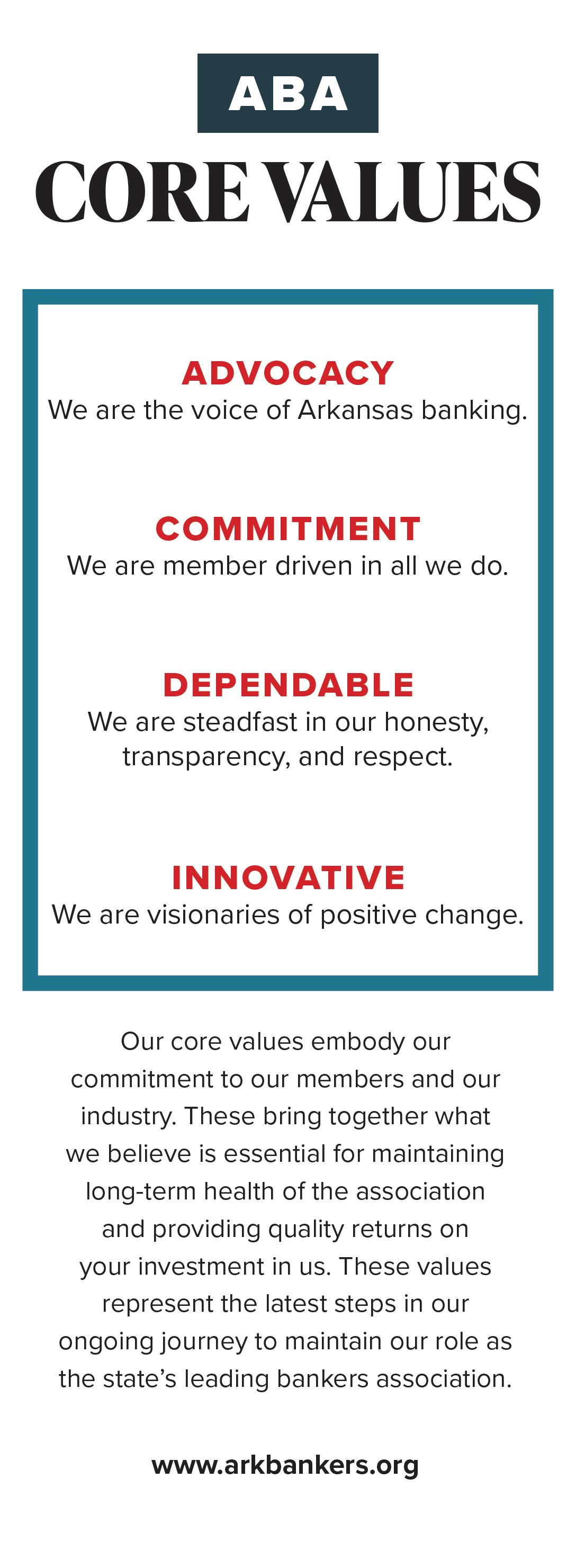
Brad Chambless, Chairman Farmers and Merchants Bank, Stuttgart
Chris Gosnell, Chairman-Elect Farmers Bank & Trust Company, Magnolia
Jason Tennant, Vice Chairman CS Bank, Eureka Springs
Scott Saffold, Treasurer Union Bank & Trust Co., Monticello
Jim Taylor, Past Chairman First Security Bancorp, Rogers
Lorrie Trogden, President & CEO Arkansas Bankers Association, Little Rock
Johnny Adams, Conway
Ian Bryan, Russellville
Ben Buergler, Bentonville
Asa Cottrell, Little Rock
Joe Dunn, Little Rock
Robin Hackett, Greenbrier
Heather Jones, Little Rock
Jeff Lynch, Little Rock
Katherine Mitchell, White Hall
John Olaimey, Little Rock
Calvin Puryear, Dumas
Randy Rawls, Warren
Lori Ross, Arkadelphia
Loren Shackelford, Fayetteville
Rob S. Tiffee, Little Rock
Ron Witherspoon, Little Rock
As I write my final column as association chairman, I continue to be humbled and grateful to have had the opportunity to serve. Reflecting on the past year has allowed me to appreciate how important our association is to the banking industry in Arkansas.
As a young banker attending association events, I met many incredible people who affected my life. Over the years, my supervisors invested in me by sending me to numerous educational seminars presented by the association. The association also allowed me to collaborate with fellow bankers and advocate for our industry in Little Rock and Washington, D.C. Membership in our association truly has its privileges.
Over my career, the banking industry has faced many challenges. I’ve seen the number of Arkansas banks decline from 160 state-chartered banks at the beginning of 2006 to 71 today. Like the banking industry, the association has been challenged to evolve and ensure it provides the highest level of support, education and advocacy to all member banks. And with that in mind, the association has some exciting things for 2025.
Banking has always been about people — customers, team members and fellow bankers. As such, member engagement will continue to be a major focus throughout the year. Beginning with the Group Summits and continuing through the Bank Management Seminar this fall, our goal is to assemble bankers from across the state to fellowship, collaborate and experience the importance of the association to our industry. Although there is quite a bit going on in Washington right now, we will continue to make every effort to bring our congressional delegation to our Group Summits so you have the opportunity to meet, interact and hear directly from them.
I’m proud of the job our association team has done to improve the education and training opportunities for our member banks. To ensure that we reach the entire state effectively and efficiently, we have increased virtual access in conjunction with live, in-person sessions. The quality of topics and speakers continues to improve, requiring larger venues to accommodate attendees. This is a wonderful challenge, and I want to sincerely thank you for sending your bankers and ask that you continue to use the association for all your education and training.
We are excited to announce that the ABA has invested in a cutting edge community forum tool to allow our members, communities and sections to network and communicate about important banking issues. Over the past two years, we have observed the CRA Section grow and become a vibrant resource for all banks. To build on that success, in February we launched, in beta, two community forums. Later this year, we will launch multiple department-specific community forums for member banks. This collaborative resource will allow you to start conversations, join discussions, upload resources and share advice on important banking issues without any expense to your institution. I want to congratulate the members and chairpersons of the CRA Section for creating an amazing resource for our association and paving the way for additional sections to benefit our member banks.
With the state Legislature in session, we are preparing to host a day at the Capitol for our emerging leaders. This is an opportunity for the next generation of bank leaders to experience the mechanics of how a bill becomes law. It also provides a first-hand understanding of the work our Government Relations Advisory Committee does to protect our industry against harmful legislation. It’s never too early to identify the

next leaders of our Government Relations Advisory Committee.
I would also like to invite all bankers to join us for our spring and fall trips to our nation’s Capitol. For those who have not been able to join us on our annual fly-in, I encourage you to make time this year, as our delegation holds more power in D.C. than at any point in my lifetime. I challenge you to join us in meeting with our delegation to foster much needed change in the regulatory landscape.
Arguably, the most exciting change this year is our upcoming annual convention. Not only will we celebrate our 135th anniversary as an association, we will be returning to Hot Springs for the first time in several years. I am very excited to be able to have Oaklawn Racing Casino Resort as our venue this year, and I hope to see you there. The day with our commissioner, along with fantastic speakers and exciting events, promises to be amazing!
As I close, I am thankful for all the incredible bankers I have met through the association, as well as for all the association has provided me over the years. The relationships, knowledge and experiences drive my passion to serve the association to ensure that every banker has the same opportunity that was afforded to me. While our members hail from all across the state, consist of various sizes and have differing business models, we all have one thing that ties us together. We focus on serving the community. Embedded within that focus lies the word “unity.” That is my wish for our association for the next 135 years, and it is also my wish for every member bank — unity. Together we are stronger and can accomplish anything.
It has truly been a privilege to have served you and your association this past year, and I wish you all the best.

- JUNE 2025
01 03 03
TUESDAY 9 A.M. –THURSDAY 4 P.M.
So, you’ve conquered Commercial Lending School and you’re now looking for the next step. Join us for this intensive program as we dive into a variety of case studies, that not only will sharpen your decision-making, but will build upon your previous lending education. Working together in small groups, participants will have the opportunity to review each case and apply the most appropriate decision-making analytical tools. We’ll wrap up the school with a discussion around best practices, trends, portfolio development, and more.
INSTRUCTOR: Ron Rushing & Mike Wasson
LOCATION: ABA Professional Development Center 1220 W. 3rd St., Little Rock, AR
THURSDAY 10 A.M. – 2 P.M.
09 11
WEDNESDAY 5 P.M. –FRIDAY 12 P.M.
The Arkansas Bankers Association’s 135th Annual Convention will be held in Hot Springs at the Oaklawn Racing Casino Resort. Along with longstanding events such as the Day with the Commissioner and the Simmons Bank Strawberry Breakfast, we will witness the installation of our ABA officers, network at our receptions, and more! Make plans to join us as we reunite for this annual event.
LOCATION:
Oaklawn Racing Casino Resort 2705 Central Ave Hot Springs, AR
16
The ABA, in partnership with other bank associations around the country, is proud to offer our members this exciting training opportunity! Participants will learn how to assess and analyze a bank’s financial performance by working with data from real institutions... and much more! In the final session of this course, participants will put what they have learned into practice. Participants will analyze a new data set, rate the bank’s performance and suggest strategic adjustments that might benefit the bank. Secure your spot in this series today!
LOCATION: Virtual
WEDNESDAY 9 A.M. – 4 P.M.
The specialized area of agricultural banking is important to the industry in Arkansas, and we’re here to help you stay on top of current issues and changes affecting your customers. Ag lending requires highly specialized lending skills as well as an understanding of the markets available to Arkansas farmers. As in all other industries, Ag banking is constantly changing. Ag lenders need to stay current on the latest issues in agricultural markets, economics, and risk management. This conference will provide both state and national perspectives to give you practical knowledge, growth strategies, and networking opportunities with Ag Bankers from across the state.
LOCATION:
Clinton Presidential Center 1200 President Clinton Ave. Little Rock, AR
WEDNESDAY 9 A.M. – 4 P.M. LOAN ASSISTANTS & PROCESSORS
This program is designed to provide lending knowledge and administrative effectiveness of one of the most important positions in a community bank’s lending staff – the loan assistant/loan processor. All of the objectives of this program are directed at increasing the performance effectiveness of these individuals. This session is perfect for loan assistants and loan processors, credit administration supervisors, and other members of the bank’s loan support staff with credit administration responsibilities.
INSTRUCTOR: Adam Trower
LOCATION: ABA Professional Development Center 1220 W. 3rd St., Little Rock, AR
THURSDAY 9 A.M. – 4:30 P.M. ADVANCED CASH FLOW
Details Coming Soon!
LOCATION: ABA Professional Development Center 1220 W. 3rd St., Little Rock, AR
TUESDAY 9 A.M. – 4 P.M.
ABA TRUST & WEALTH MANAGEMENT
This annual conference is designed with the trust and wealth management professional firmly in mind. Our timely curriculum will cover topics pertinent to the issues currently challenging the trust and wealth management industry.
LOCATION: ABA Professional Development Center 1220 W. 3rd St., Little Rock, AR
17 22 28 02 29 30
MONDAY 8 A.M. –FRIDAY 5 P.M.
From recruitment to selection, performance management to career development, the human resource function has a direct impact on a financial institution’s productivity and bottom-line results. Human Resource Management School is a oneweek school that provides the foundation for new or veteran human resource professionals to tie together important issues in human resource management with an understanding of the business of banking. A scholarship is offered through the ABA -- please contact Kami at kami.coleman@ arkbankers.org for an application!
LOCATION: Fluno Center for Executive Education Madison, Wisconsin
TUESDAY 9 A.M. –WEDNESDAY 4 P.M.
This fundamentals school is designed to provide individuals of the knowledge of the federal regulations and gain an understanding of the requirements for each area. The sessions are separated into two days and with a concentration on lendingrelated areas as well as deposit/ operations and the Bank Secrecy Act. Whether you are a new compliance officer or needing a comprehensive overview of the compliance areas, this will be an informative school with the ability to ask the experts questions in a live environment.
LOCATION: ABA Professional Development Center 1220 W. 3rd St., Little Rock, AR
Live events are subject to a virtual learning environment. For more information, contact the ABA at (501) 376-3741 or Kami Coleman at kami.coleman@arkbankers.org.
Rob Nichols | President and CEO | American Bankers Association
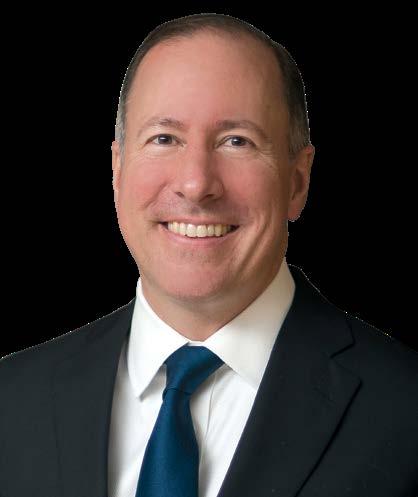
At the beginning of this year, my travels on behalf of ABA took me to southern California at a time when deadly wildfires were still raging through many neighborhoods in Los Angeles and the surrounding area.
As I sat there in that room full of bankers, friends and colleagues, the sentiment I felt was unmistakable: that when the smoke cleared and the dust settled, bankers would be there, ready to serve their communities and support the recovery—just as they have done throughout American history.
As I reflect on ABA’s 150th milestone anniversary in 2025, and as I look at where we are as a nation today, I am reminded that bankers have a long and proud tradition of coming together during hard times to work together and find solutions.
That certainly was true of ABA’s founding; in 1873, the United States was facing a financial panic and one of the worst recessions in history. Unemployment and bankruptcies were surging, and 300 banks failed. It was on the heels of this unrest that two young bankers—inspired by the women’s suffrage movement and the power of collective action—worked to convene the first-ever meeting of the American Bankers Association in July 1875 in Saratoga Springs, New York.
Since then, ABA has provided a forum for bankers to meet and together develop solutions that make the banking sector stronger, safer, and more accessible.
Just a few examples: We helped mobilize bankers to safeguard bank funds during a string of bank robberies in the 1890s; we pioneered the routing number system that made it easier for customers to move money; and we encouraged bank lending throughout World War II to help finance military operations through bank purchases of government bonds.
In more recent times, ABA has supported banks’ role as economic first responders in the wake of major natural disasters (like the recent floods in Kentucky) and a global pandemic, and we have helped bolster their mission of making sure that the American dream is achievable for all Americans, particularly those in historically underserved communities.
As we continue to face a climate of unprecedented challenges, from a deeply divided political landscape to heightened economic uncertainty, our nation’s banks remain strong, resilient and ready to respond to whatever comes our way. ABA is standing ready to aid them in their important work.
Despite the many things today that threaten to divide us, much like our founders did 150 years ago, I too believe that we are stronger together. And I hope that in the months and years to come, you’ll continue to be an active part of this organization. Continue sharing your voices, your perspectives and your ideas as we work to shape the future of banking policy in this country over the next 150 years.
Together, we can—and will—achieve more.
Email Rob at nichols@aba.com.
“As I reflect on ABA’s 150th milestone anniversary in 2025, and as I look at where we are as a nation today, I am reminded that bankers have a long and proud tradition of coming together during hard times to work together and find solutions.”

Susannah Marshall | Commissioner | Arkansas State Bank Department
On February 5 th, I had the extreme honor and pleasure to testify at Chairman French Hill’s inaugural House Financial Services Committee hearing in Washington, D.C. The focus of this hearing was the state of the community banking industry, issues impacting the community banking sector and what the future holds for community banks. I was one of five witnesses, and I was pleased to share the opportunity with our very own Arkansas community banker, Cathy Owen, Chairman of Eagle Bank & Trust Company in Little Rock. In my opinion, I believe the hearing was very successful as it relates to sharing the message and sounding the alarm on what community banks, regulators, policy makers and other industry participants must elevate in the near future in order to promote the community banking sector and ensure its viability for many years to come.
As a regulator, I believe I can, and should, bring a unique perspective to most industry conversations. At this hearing, I felt the majority of us shared common themes and consistent comments about community banks and the position they hold in our financial services industry. Although my written and oral testimonies are both available on-line, I would like to use this column to highlight and summarize key statements from my remarks, these include:
• State Supervision, Community Banks, and Economic Growth
• Challenging Operational Environment for Community Banks
• Supervisory and Regulatory Burden on Community Banks
» Process Driven Federal Supervision
» Static Federal Regulatory Thresholds
» Federal Regulatory Burden
» Centralized Federal Decision-Making
• Ensure Continued Access to Community Bank Funding Sources
• Facilitate Community Bank Innovation Through Third-Party Partnerships
• Information Sharing and Cybersecurity Tools to Support Innovation
• Support New Bank Formation & Healthy Merger Activity
To expand on a few of the items above, let’s begin with the significant position that community banks hold in the industry, the vast number of banks in this country and in this state are community banks, regardless of any regulatory definition. We all know and can easily agree that community banks are the lifeblood of the communities in which they operate, and they serve areas of our state which would not be otherwise served by the largest U.S. institutions. These community banks are vital sources for economic development, local engagement and financial support, and significant providers of funding for small business customers.
The current operating environment for community banks is challenging, to say the least. Most surveys indicate that regulatory burden is high on the list of concerns for community banks, and I hear that from you during our individual conversations. Whether it is the overreach of the proposed Dodd-Frank Act Section 1071, the costly and high-consequence challenges presented by the stale and static reporting thresholds of the Bank Secrecy Act, the outdated and arbitrary large bank asset level, or the myriad of other federal regulations

that often times still result in a waterfall effect on community banks despite being focused on larger institutions, it all creates a disproportionate, operational impact on the community bank model.
Our nation is best served by a diverse financial services sector, as we have benefited from for many years. This sector must be led by a large number of community banks who are able to engage in innovation, have access to an array of funding sources, select the charter and federal supervisory partner of their choice, successfully adopt technology in a cost-efficient way and combat the increasing threat landscape of cybersecurity risk. Like most other states, it has been many years since our agency has received a de novo bank application, and I hope that future regulatory changes can help support a return of capital investment, new business models, and new entrants. As I have said many times before, we need a healthy and vibrant banking industry where banks have not only the ability to simply survive, but to thrive
“Like most other states, it has been many years since our agency has received a de novo bank application, and I hope that future regulatory changes can help support a return of capital investment, new business models, and new entrants.”

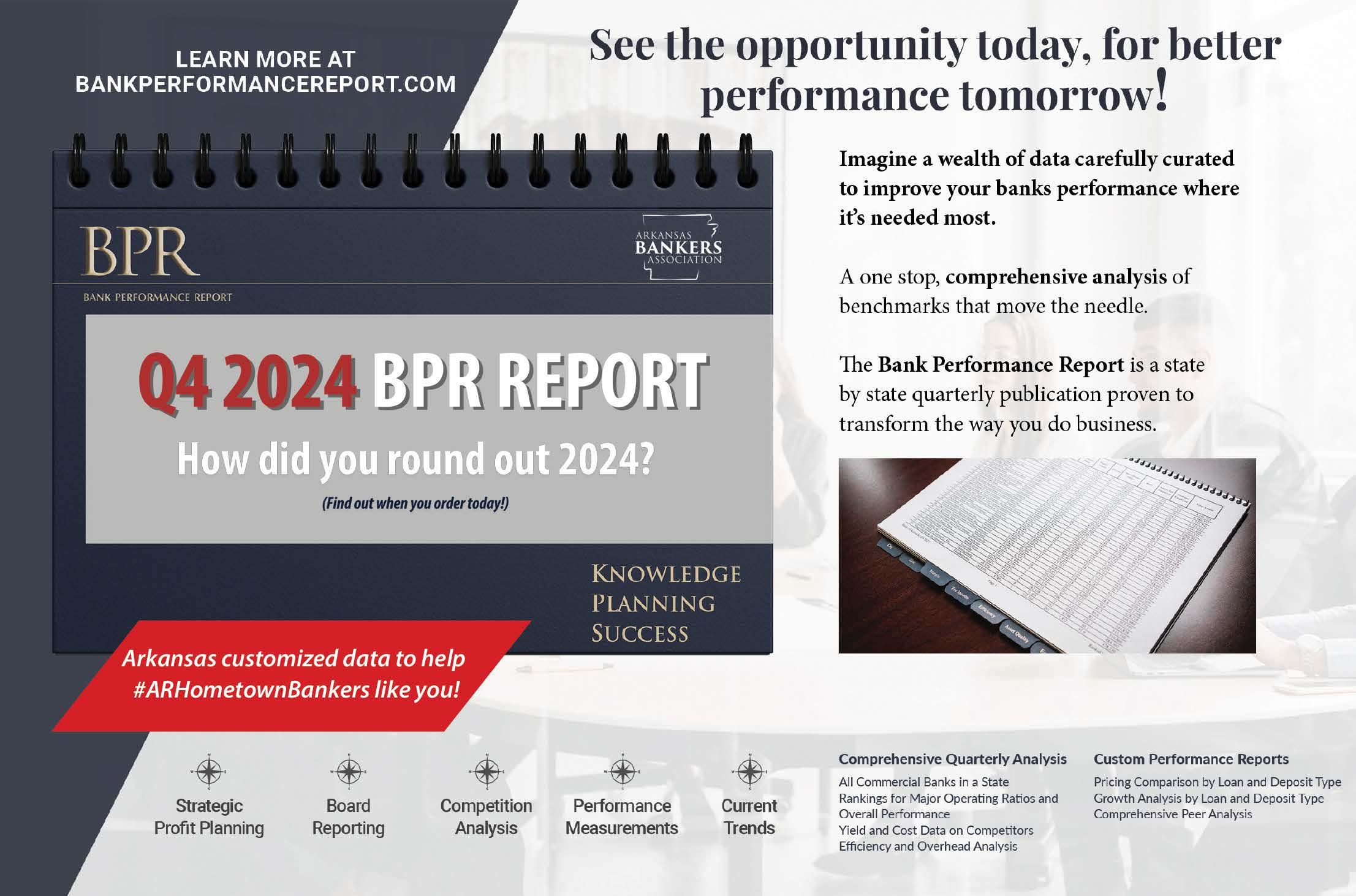
Commercial Loan Officer II/VP
Generations Bank, Fayetteville
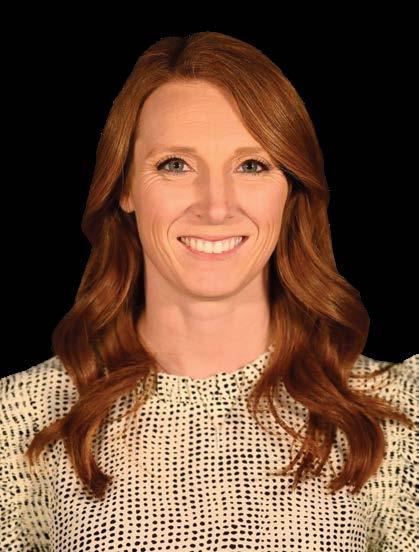
I started out in banking the summer before my senior year of college, where I worked as a teller for a few months. It was a great way to interact with customers and realize they are the face of a bank. To me, tellers get more interaction than most people in the bank. Once I graduated college the next year, I was hired by Generations Bank as a credit analyst. I spent a year and a half in that position putting together cash flow analysis and learning all about the financial side of the credit. From there, I moved into the commercial loan officer position where I have now spent the last six years. In this role, I work with customers helping them with their lending needs and any other financial services we can provide at Generations Bank.
I really enjoy the personal relationship side of working for a small community bank. We truly want to know about our customers and their business, it is one of my favorite things about working for a bank. People love to talk about their business and how they started out and grew it to where it is now. I enjoy being the face of the bank while I am out serving the community as a volunteer. In a small bank, I often work with other departments of the bank, which gives me the chance to better understand how the entire bank works. I learn something new every day, particularly when I have the opportunity to work with executive management, which would rarely happen in a much larger organization.
My dad is my biggest mentor inside and out of the banking world. He has over 40 years of banking experience and has been able to give me excellent advice. He is someone who has worked very hard in his career and has continued to be a leader for his employees. He has taught me to never pass up an opportunity that could help me in the future, but to also know when you need a break to step back and relax. Preferably on lake time though!
I remember the greatest advice I ever received was from my dad in college. He told me to take each day one at a time. If you try to think too far in the future,
“The ABA serves as a voice that represents our industry in Washington, D.C. to address the concerns of Arkansas banks. I think it is a great way for fellow bankers to gather and network where ideas and challenges can be solved together.”
“I am a Commercial Loan Officer/VP at Generations Bank in Fayetteville. I recently got married last summer to my best friend, Justin. We have enjoyed starting our new life together and recently bought our first home. We have two dogs, a Golden Retriever and Golden Doodle who keep us busy wanting to go on walks and be played with all the time. My husband and I enjoy traveling and going to the lake most weekends in the summer.”
you will be overwhelmed. A lot of things are out of our control, so focus on what is going on now and the best way to approach the obstacle.
The Arkansas Bankers Association (ABA) advocates for Arkansas banks and the banking industry. They work to improve our industry, promote economic growth and enhance the lives of our customers and the communities we serve. The ABA serves as a voice that represents our industry in Washington, D.C. to address the concerns of Arkansas banks. I think it is a great way for fellow bankers to gather and network where ideas and challenges can be solved together. I have enjoyed being a part of the ABA and Emerging Leaders group. It has opened my eyes to the market and other banks by showing me what other bankers deal with daily - both positive and negative. We get to learn and help each other out along the way. I also think as a young banker it is great to work for a bank that wants to give back to the younger generation. I take everything as an opportunity to learn and grow in my career.
I can never resist a nice, warm day on the lake. I have grown up going to the lake just about every weekend in the summer. It is great family time where we get to relax and soak up the sun together! We call it our “Happy Place.”

Ian Bryan | Chairman | Emerging Leaders Section
In a state where community and relationships have always been at the heart of banking, a new generation of young leaders is stepping up to ensure that Arkansas’ community banks remain relevant, innovative, and deeply connected to the people they serve. These emerging bankers are not only embracing technological advances but are also committed to preserving the core values of trust, personal service, and local impact that community banks have long been known for.
Arkansas’ community banks have traditionally focused on providing personalized service to local residents, offering everything from small business loans to mortgage services. However, the banking landscape is rapidly changing. With the rise of digital banking and increased customer expectations for speed and convenience, young leaders are taking proactive steps to blend innovation with tradition.
Many young bankers are spearheading digital transformation initiatives within their institutions. They are introducing mobile banking apps, upgrading websites, and improving online loan application systems, ensuring that their clients have easy access to banking services no matter where they are. But despite the increased reliance on technology, these young leaders are ensuring that the personal touch remains central to customer experience.
By embracing these technologies, young bankers are creating a seamless experience that enhances convenience while ensuring that community engagement remains a priority.
Small businesses are the backbone of Arkansas’ economy, and young leaders in community banking are working hard to make sure local entrepreneurs have the financial support they need to thrive. Arkansas’ small businesses often rely on community banks for crucial services, such as loans, credit lines, and financial advice.
Young bankers are streamlining these services, ensuring that small business owners can quickly and efficiently access the resources they need to grow their businesses. Whether it’s implementing faster loan application processes or offering more flexible terms for startups, these young leaders are dedicated to helping entrepreneurs succeed. They understand the unique challenges small businesses face, and their knowledge and proactive approaches are making a significant impact.
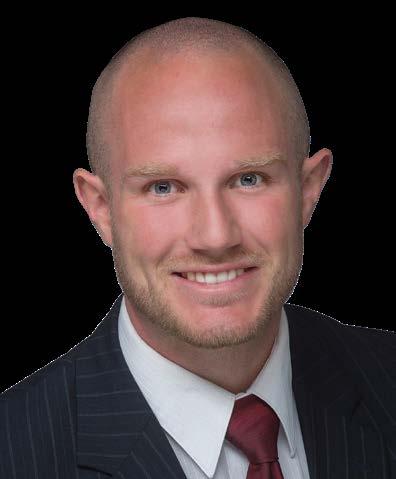
Additionally, many young bankers are expanding their outreach to underserved communities, helping to ensure that minority-owned businesses and rural entrepreneurs have access to the same resources and opportunities. By forging partnerships with local chambers of commerce and community organizations, they are strengthening the business ecosystem in Arkansas, one small business at a time.
Perhaps the most remarkable aspect of young leaders in Arkansas’ community banks is their unwavering commitment to the communities they serve. While technology, innovation, and financial products are important, these leaders recognize that their role goes beyond just banking.
Many young bankers are actively involved in their local communities, supporting charitable organizations, local events, and development projects. Whether it’s organizing a fundraiser for a local nonprofit, volunteering at community events, or supporting local schools, these leaders are using their platforms to drive positive change in the state.
Additionally, they are keenly aware of the economic challenges facing rural Arkansas communities. As a result, they are working to ensure that rural residents have access to the same banking services as those in larger urban areas. Young bankers are committed to strengthening the communities they serve.
As Arkansas’ economy continues to evolve, the leadership of young bankers will be instrumental in shaping the future of community banking in the state. Their combination of technological innovation, business support, financial education, and community involvement is creating a new model of banking that is more inclusive, efficient, and customer-focused than ever before.
Young leaders are not just filling the shoes of their predecessors; they are forging their own path, creating a future where community banks remain an essential part of Arkansas’ economic fabric. With their forward-thinking approaches, these young leaders are ensuring that Arkansas’ community banks will continue to thrive and make a lasting impact on the lives of those they serve.
As they continue to grow into their leadership roles, the influence of these young bankers will help shape the next chapter of Arkansas’ banking story — one rooted in both tradition and innovation.


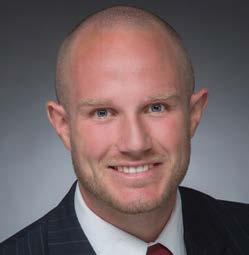
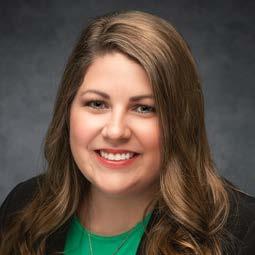
IAN BRYAN CHAIRMAN
FIRST STATE BANK
Russellville
Group 2
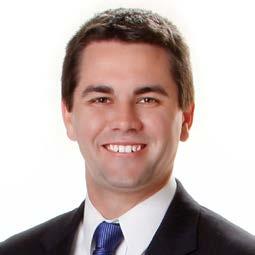
AMBER MURPHY CHAIRMAN-ELECT
FIRST FINANCIAL BANK
El Dorado
Group 3
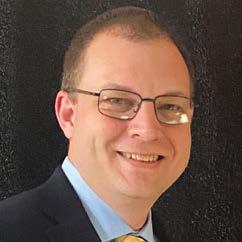
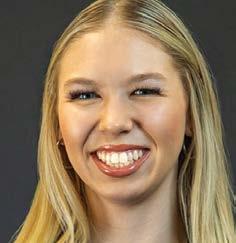


BRITT BURRIS
CONNECT BANK
Star City
Group 3

BAILEY EADS
FARMERS BANK & TRUST COMPANY
Magnolia
Group 3

JAKE EARNEY
CHAMBERS BANK
Fayetteville
Group 2

WILL EDWARDS
FIRST SECURITY BANK
Jonesboro
Group 1
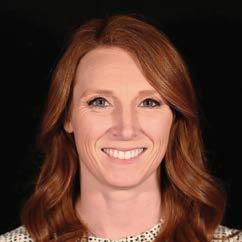
GABE ROBERTS
SECRETARY/TREASURER
FIRST COMMUNITY BANK
Jonesboro
Group 1
BRITTANY HELMS
SIMMONS BANK
Little Rock
Group 1
BRANDON KNOWLTON
SOUTHERN BANCORP
Helena-West
Helena
Group 3
MICKEY BELLE SHIELDS MANLEY
CS BANK
Eureka Springs
Group 2
SARAH TEFTELLER
GENERATIONS BANK
Fayetteville
Group 2

by Roby Brock

Farmers and bankers are coping with harsh conditions and it has little to do with the daily weather.
The lack of a Farm Bill coupled with a delay in information from the new administration in Washington, D.C. is compounding economic trepidation in the agricultural space. Farmers have not gotten the guidance they need from the Farm Service Agency (FSA) related to disaster loans, and with early planting season in full swing, decision-making has a shroud of uncertainty about it.
“Due to the obvious challenges the agriculture industry is facing, many Arkansas banks have exercised extreme patience in underwriting crop loans for the 2025 season,” said Brad Chambless, CEO of Farmers and Merchants Bank and Bank of Fayetteville. “Primarily, we have been waiting on guidance and confirmation of how and when farmers will receive any aid from the disaster support package passed by Congress in January. Albeit a far cry from making farmers whole, any source of cash flow is material in terms of being able for farmers to make intelligent business decisions moving forward.”
The American Relief Act of 2025 included $31 billion in natural and economic disaster aid for farmers and ranchers as well as a second extension of the 2018 Farm Bill, but guidance for how to make claims has put financing in a significant wait-and-see mode.
“We have customers who need the support of the USDA and FSA programs this year more so than ever before,” added Chambless. “Unfortunately, this delay has caused a backlog of applications and placed additional pressure on FSA offices across the state. In fact, we are already experiencing delays in processing, and my concern lies in whether farmers will be able to get their applications processed in time to be useful for the 2025 crop year.”
NICK ROACH OUTLINED THREE PRIORITIES HE HOPES THE NEW FARM BILL WILL ADDRESS. THEY INCLUDE INCREASING THE FSA LOAN LIMIT, THE PROTECTION OF PRICE FLOORS, AND RE-ALLOCATING BASE ACRES ON CROPS THAT ARE 20+ YEARS OLD.
Bruce Maloch, Vice-Chairman & General Counsel at Farmers Bank and Trust in Magnolia, said another problem area causing the backlog is the lack of personnel at FSA to help process the aid. He notes that there is only one person who handles FSA claims in all of Arkansas and the U.S. Department of Agriculture is going through a period of convulsion as potential buyouts to federal employees are being considered.
“WE ARE ALREADY EXPERIENCING DELAYS IN PROCESSING, AND MY CONCERN LIES IN WHETHER FARMERS WILL BE ABLE TO GET THEIR APPLICATIONS PROCESSED IN TIME TO BE USEFUL FOR THE 2025 CROP YEAR.”

“This is where the backlog begins,” said Maloch.
Maloch’s lenders have also communicated to him that rising input costs – everything from insurance to implements to fertilizer have at least doubled in price.
“The margins are slim, but I’m not sure it’s sustainable long-term,” said one of Maloch’s lenders.
Maloch said caution has to be used on financing older farms and not extending terms past the useful age of the houses or with the newer farms to not extend the payout of the loan past the incentive payout maturity unless it is well-secured by real estate to mitigate the loan term.
Stone Bank CEO Nick Roach said FSA has been a great partner in the past, but he is hopeful that new, higher limits may be government-guaranteed to extinguish some risk.
“For bankers willing to understand their requirements and processes, the FSA is a great partner for bankers as it offers flexible programs, rates, and structures for lending,” said Roach. “One drawback is that their guaranteed loan limit is currently $2,251,000. This amount often falls short of the farmers’ financial needs, so a partnership between the bank and the FSA can be a critical component for farmers to obtain sufficient funding.”
A new Farm Bill, which is being debated in Washington, D.C., could go far to alleviate many financial hurdles that have bankers and farmers worried. Led by Sen. John Boozman, R-Ark., the Senate Agriculture committee has been holding a series of meetings and gathering comments from experts across a wide range of issues that the Farm Bill covers. However, relief from the Farm Bill is not expected until the back half of 2025.
Randy Scott said a new Farm Bill has to recalculate some of the safety nets that allow farmers to take the risks they need to grow crops and meet their financial obligations.
“It is imperative that we get a new Farm Bill passed ASAP and not continue to extend the 2018 Farm Bill. The input costs for growers are at record highs; meanwhile, harvest prices of the major crops are down 21% from the beginning of 2024,” said Scott.
“It is imperative that the new Farm Bill would have safety nets based on 2025 input costs and commodity prices versus the 2018 figures we are working off of right now. Additionally, a price index needs to be built in for years following 2025,” he added.
Brad Chambless said the delays in Congress has monumental consequences for farmers, and subsequently, for bankers.
“Currently, we are operating under the 2018 Farm Bill, which has been extended under the same terms and reference prices originally set almost seven years ago. In order to adequately address the cause of the current agriculture crisis, the new Farm Bill must include provisions for periodic review of the economy,” said Chambless.
“In particular, a review of commodity prices, inflation, and reference prices must be analyzed on an interim basis to ensure adequate support of the agriculture industry. In order to ensure that the reference prices in the Farm Bill remain relevant to provide meaningful price support, I would recommend an annual review of the data.”
Nick Roach outlined three priorities he hopes the new Farm Bill will address. They include increasing the FSA loan limit, the protection of price floors, and re-allocating base acres on crops that are 20+ years old.
“The FSA loan limit is $2,251,000 currently and is indexed with inflation each year, however this hasn’t kept up with real inflation. Whether it is a poultry operation, row crop operation or other types of farming, input costs and construction costs have all risen double digits every year in the past five to seven years. The House and Senate both have proposed a $3,500,000 FSA loan limit, which would go a long way toward easing the financial strain on farmers, we could always use more,” said Roach.
He also said price protection can help through Agriculture Risk Coverage (ARC) and Price Loss Coverage (PLC) insurance programs. The limits established for the PLC programs are that the commodity prices are set low, but input costs have risen which results in reduced coverage.
Roach cited as an example, if a farmer can sell corn at $5 a bushel, the PLC coverage kicks in at anything below $4 a bushel. However, since input costs have increased 20%, then the farmer has essentially lost 20% margin with no margin protection. The margin is what pays back the operating loans, equipment loans, and land loans, while also allowing the farmer to continue operating with some reasonable assurance year over year.
“The Farm Bill aims to address this, but it’s a complex problem where the margin between prices and input costs is what needs to be considered,” he said.
Roach also said an update to the base acres of a farm would prove beneficial to agribusinesses. When the farmer 10+ years ago established a base acreage in a crop that they planted, it would be ideal to update their base acres every three years going forward. This would allow flexibility for the farmer to rotate crops and be paid for the crops that they recently planted rather than those of 10 years ago.
Additionally, the yields associated with the base acres should be updated to today’s standards, Roach said.

by Roby Brock
Representing a number of different constituencies, Cathy Owen testified before the House Financial Services Committee, led by Arkansas Congressman French Hill, R-Little Rock, on February 5th in Washington, D.C.
Owen, is the Chair, President & CEO of State Holding Company and Executive Chair of Eagle Bank & Trust Company of Little Rock. She is a past president of the Arkansas Bankers Association and currently serves as Vice-Chair of the American Bankers Association board of directors.
With over 51 years of banking experience, Owen’s testimony has layers of real-world experience guiding her advice and recommendations. She was joined by Arkansas Banking Commissioner Susannah Marshall, who summarized her testimony before the committee in her quarterly column in the Arkansas Bankers magazine (see p. 10).
Owen outlined for Congressional members on the committee the challenges community banks are facing and how a number of proposed bills can remedy hurdles.
“For the last few years, the banking industry has faced a ‘tsunami’ of new rules and regulations from the financial regulators. ABA President and CEO Rob Nichols said in a December 19, 2023, letter to President Biden that ‘ABA is concerned about the cumulative impact of uncoordinated regulatory initiatives that have the potential to significantly disrupt retail and commercial banking in ways that will negatively impact the economy, and the customers banks serve.’
“Unfortunately, not only did the avalanche of regulation continue, but it also actually increased, and we have been forced to take the unprecedented action of bringing six lawsuits against the CFPB and
other federal regulatory agencies challenging rulemakings that have overreached or exceeded the agency’s statutory authority.
“Disturbingly, a host of new initiatives were pushed through the door in the waning days of the former administration by the CFPB that if not overturned by Congress or by the regulatory agencies could have profound and lasting negative effects on the industry, consumers and our economy,” said Owen.
Expressing appreciation and support for Chairman Hill’s “Make Community Banking Great Again” initiative, Owen said banks in Arkansas and across the nation would be helped by many of the changes.
“We outline several legislative and regulatory actions Congress, the administration and other policymakers can take to help banks, including community banks, drive a healthy economy, pursue rational regulation to preserve Main Street access to credit and capital, and foster a competitive and innovative financial services market,” she said.
Enact Legislation to Encourage Formation of De Novo Banks. Bank consolidation is a long-term trend. In fact, there are 4,316 fewer banks in the U.S. today than in 2005. Of the banks active today, only 79 were established after 2010. We believe that consolidation could be tempered by robust de novo bank creation, and our industry has always welcomed competition.
That is why we endorse legislation to spur the creation of new banks by easing federal capital requirements during their first few years of existence. The “Promoting New Bank Formation Act” (H.R.478/S.113) would establish a three-year phase-in period for new banks to comply with federal capital standards and make other changes to ease the regulatory hurdles for recently formed institutions.
Enact Pro-Growth Tax Policy. Enact progrowth tax policy that encourages investment and expands opportunity for all Americans by ensuring a competitive corporate tax rate. For example, the Section 199A pass-through deduction should be continued because it enables many community banks to play a vital role in local economic development. We strongly support the Main Street Tax Certainty Act (H.R. 703/S. 213), led by Rep. Lloyd Smucker (RPA) and Sen. Steve Daines (R-MT), which would make the tax deduction for qualified business income permanent.
Enact ACRE. Enact the Access to Credit for our Rural Economy Act (ACRE). It will sustain and grow rural America by lowering the cost of credit and making credit more widely available for farmers and ranchers financing agricultural real estate as well as the cost of homeownership in 17,000 rural communities. The ACRE Act is a bi-partisan tax-based solution to lowering costs for farmers, ranchers, and rural communities. We are looking forward to its reintroduction this Congress.
Support Mission-Driven Banks. Support the work of Minority Depository Institutions (MDIs) and Community Development Financial Institutions (CDFIs) – banks that are uniquely focused on serving communities of color and low-to-moderate income communities – by ensuring robust funding for the CDFI Fund within the U.S. Treasury Dept. and creating a CDFI investment tax
Owen outlined for Congressional members on the committee the challenges community banks are facing and how a number of proposed bills can remedy hurdles.
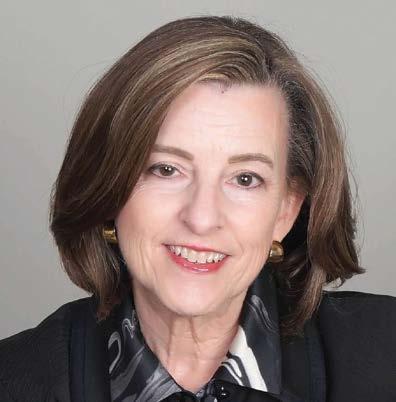

credit that would incentivize long-term capital investment in these vital institutions.
Support Affordable and Sustainable Housing. Approach housing policy holistically by supporting initiatives that create affordable and sustainable housing opportunities across all communities while ensuring liquidity to primary and secondary markets, including through government-sponsored enterprises (GSEs) and the Federal Home Loan Banks. Combat Fraud. Combating fraud is a critical issue for our members and their customers, but the banking industry cannot win this fight on its own. Congress and the regulatory agencies should pursue an “all of government” approach to combatting financial fraud to protect consumers and reduce the number of Americans who fall victim to scams. Specifically, the administration should establish a White House office to develop and coordinate a National Scam and Fraud Prevention Strategy, the Federal Communications Commission should establish a database of reported spam text messages, and Congress should work to create a Financial Crimes Intelligence Center in every state, modeled after the FCIC located in Texas.
Inflation-Proof Regulatory Tailoring. The banking industry is a strong proponent of regulatory tailoring and was supportive of 2018’s bipartisan banking legislation (S. 2155) and its related rulemakings. However, like many rules, the S. 2155 rulemakings used static asset thresholds as a metric. Fixed dollar thresholds can become outdated over time, particularly in higher inflationary environments, leading to application of regulatory requirements that may not accurately represent an institution’s risk profile or potential systemic impact. As a result, these thresholds should be indexed to the Consumer Price Index (CPI) or to total assets within the banking industry.
Enact a Congressional Review Act Resolution Disapproving of the Final CFPB Overdraft Rule. On December 12, 2024, the CFPB finalized a rule that goes beyond the agency’s statutory authority and, if allowed to take effect, will lead banks to restrict, if not eliminate, access to overdraft. If not invalidated, the rule would effectively bring an end to overdraft services for millions of consumers who – following receipt of a consumer-tested disclosure – choose to use the product to cover emergency expenses and other liquidity shortfalls, all to advance the prior administration’s political campaign against so-called “junk fees.”

Repeal the Small Business Lending Data Collection Rule (Section 1071). Section 1071 of the Dodd-Frank Act requires lenders to report 13 data fields on applications for credit by minority-owned, women-owned, and small businesses. It also requires the CFPB to publish the data annually with certain redactions.
Oppose New Credit Card Routing Mandates and Interchange Caps. Oppose new government mandates on credit card routing such as the so-called Credit Card Competition Act (CCCA) , and urge the Federal Reserve to put low- and moderate-income consumers before the needs of large retailers by withdrawing its proposal to impose misguided debit card interchange price controls that will raise the cost of basic checking accounts.
Repeal the Community Reinvestment Act Final Rule (CRA). ABA urges the banking agencies to issue a proposed rule that would repeal the 2023 CRA rule and replace it with the 1995 CRA rule, which remains in effect pending the resolution of ABA’s legal challenge. Then the agencies should repropose updates to the 1995 CRA rule that are consistent with the agencies’ authority under the statute.
Enact the SAFE Banking Legislation. Enact the SAFE Banking Act to get state-sanctioned cannabis cash off the street and into regulated financial institutions, making our communities safer and the cannabis industry more transparent to regulators, tax authorities and law enforcement.
Delay Implementation of CFPB Section 1033 Open Banking Rules. Delay implementation of rules to implement Section 1033 of the Dodd-Frank Act and finalize a pending CFPB rule to supervise data aggregators before significantly overhauling the 1033 rule to address scope, liability, and cost.
Delay Implementation and Withdraw CFPB Late Fee Rule. Delay implementation and withdraw the CFPB’s rule on credit card late fees to preserve access to credit for low-and moderate-income borrowers as litigation remains active.
Reform of Merger Rules. The Department of Justice and the Federal banking agencies should move forward with their plans to revise the current bank merger guidelines, which date from 1995.
Stop Regulatory “Operation Choke Point” Initiatives. As noted in our feedback to Chairman Hill regarding the Principles for Making Banking Great Again, we have expressed concerns regarding initiatives like Operation Choke Point, emphasizing that banks should not be compelled by regulators to terminate customer accounts without substantial justification.
Enact CFPB Reforms. Since its inception, the flawed leadership structure of the CFPB has led to large and counterproductive policy swings driven by electoral outcomes. These policy swings create uncertainty that discourages innovation and requires resources to be redirected to regulatory compliance and away from serving customers. To minimize these policy swings and to bring greater stability and balance to the CFPB, ABA urges Congress to support legislation establishing a Senate-confirmed, bipartisan commission at the Bureau.
Enact Deposit Insurance Reform. At a minimum, Congress should give the FDIC the authority and flexibility it needs to enable a timely response to crises, ensuring fair treatment across banks of all sizes and reducing reliance on the systemic risk exemption.
“I would describe it as an intense four plus hours on camera, knowing I was speaking on record before lawmakers, the media, and the public, while also knowing we are potentially shaping policy narratives, in real-time.”
Support National Bank Preemption. Defend the dual banking system, a pillar of economic strength that spurs innovation and empowers banks to serve every market in the United States, from states’ efforts to assert authority over basic operations of national banks.
------
Owen said the process of testifying before Congress can be intimidating, but it’s also pretty awe-inspiring.
“It was certainly an honor and a privilege to be asked to testify before the House Financial Services Committee. The American Bankers Association prepared me for the pointed questions, political theater, and constant flow of people in and out of the room, but it is difficult to fully grasp the focus and mental agility required until you are in the moment of testifying. I would describe it as an intense four plus hours on camera, knowing I was speaking on record before lawmakers, the media, and the public, while also knowing we are potentially shaping policy narratives, in real-time,” said Owen.
“Since we never knew when we would be called upon for a response, I remained so focused, I didn’t think about being nervous, but I did feel the pressure of quickly thinking through each word of my responses. Each of the witnesses were allowed to have support, or an advisor, sit behind them, in case we erred in a response or needed help responding to a question. Fortunately, none of us needed to rely on our support. Members were also allowed to submit follow-up questions to us. I received two questions, of which my responses have been remitted. I’ve been amazed by the number of people who watched the testimony and the many congratulatory and ‘thank you’ emails I’ve received from across the country,” she added.


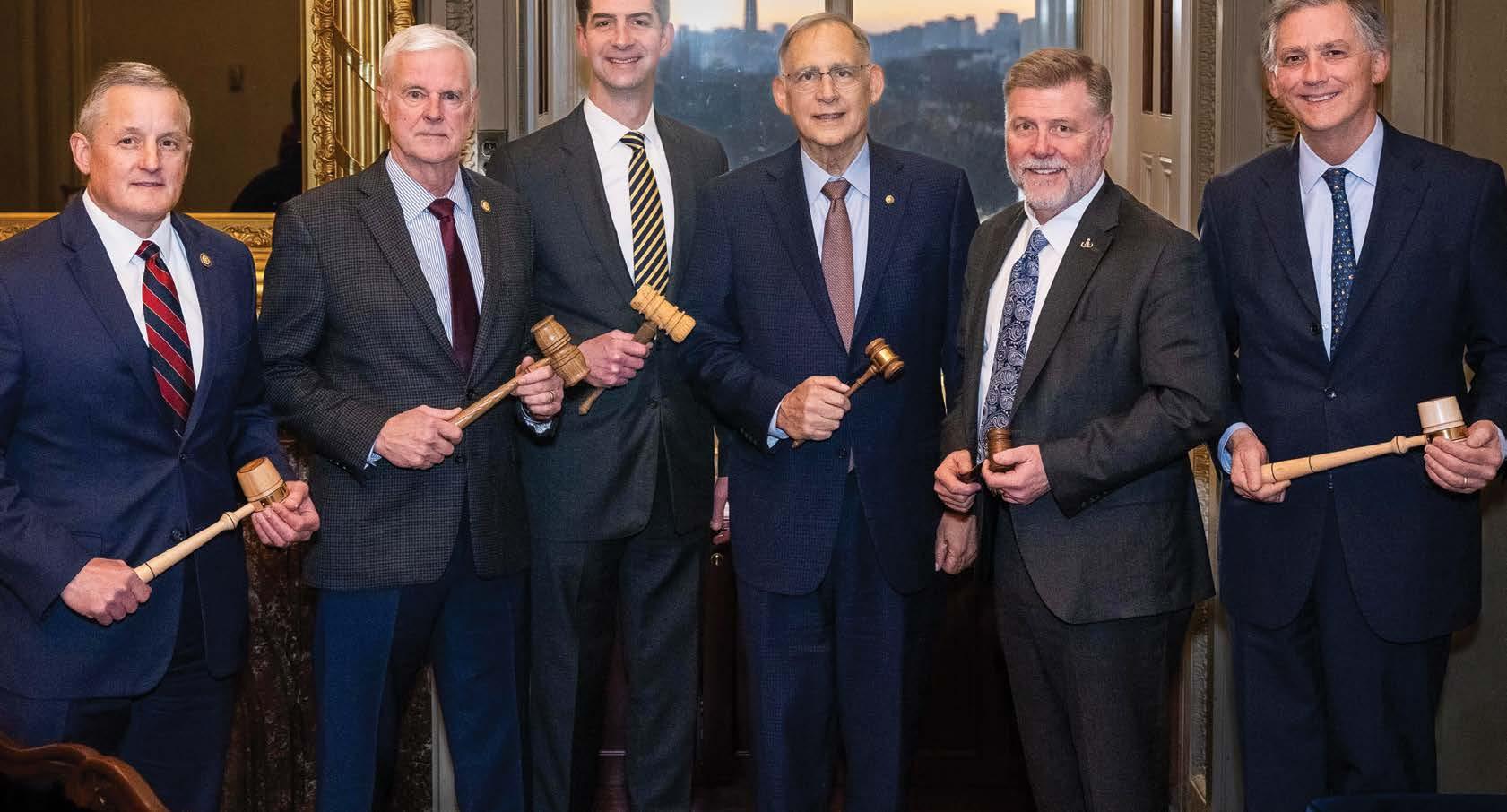
by Roby Brock
Arkansas’ all-GOP Congressional delegation will wield a lot of influence in the 119th Congress. Arkansas’ two U.S. Senators will chair influential standing committees, while all of the state’s four Congressmen will chair panels with broad reach.
With Republicans in charge of both chambers of Congress and the White House, six Arkansas Congressional leaders serving as chairmen will bring incredible attention and power to the state’s members.
U.S. Sen. John Boozman, R-Ark. has been selected to chair the Senate Committee on Agriculture, Nutrition and Forestry. Ironically, he is the first chairman of this committee since U.S. Sen. Blanche Lincoln, D-Ark., held the gavel before Boozman defeated her in 2010.
Boozman also sits on the Committee on Appropriations, Committee on Environment and Public Works, Committee on Rules and Administration, and Committee on Veterans’ Affairs.
U.S. Sen. Tom Cotton, R-Ark., first elected to the Senate in 2014 after one term in the U.S. House, will serve as chairman of the Select Committee on Intelligence, one of the most important panels for national security. Cotton takes over from U.S. Sen. Mark Warner, D-Va., as chairman.
The Intelligence Committee oversees the Office of the Director of National Intelligence, Central Intelligence Agency, Defense Intelligence Agency, National Security Agency, National Geospatial-Intelligence Agency, National Reconnaissance Office, as well as the intelligence-related components of the Department of State, Federal Bureau of Investigation, Department of the Treasury, and Department of Energy.
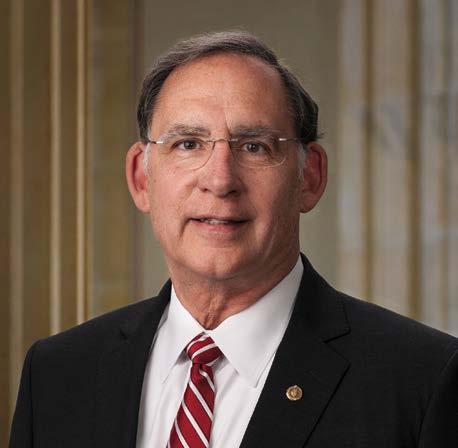
U.S.

Cotton also serves on the Committee on Armed Services, Committee on Energy and Natural Resources, and the Joint Economic Committee.
As head of the Intelligence Committee, Cotton will be part of the Gang of Eight, which includes the leaders of each of the two parties from both the Senate and House of Representatives, and the chairs and ranking minority members of both the Senate Committee and House Committee for intelligence. They are among the first Congressional leaders briefed on national security developments by the President and executive branch authorities.
Brad Howard, a consultant with D.C.-based Corcoran Street Group, says Cotton’s recent elevation to the post is extremely important.
“Tom Cotton has always come from more of the academic approach to legislating. He’s got a very strong vision on foreign policy that has aligned with President Trump’s. I think he’ll be a staunch ally for President Trump in his ‘America First’ foreign policy engagement,” said Howard.
AS HEAD OF THE INTELLIGENCE COMMITTEE, U.S. SEN. TOM COTTON WILL BE PART OF THE GANG OF EIGHT, ALONG WITH CONGRESSMAN RICK CRAWFORD ... THEY ARE AMONG THE FIRST CONGRESSIONAL LEADERS BRIEFED ON NATIONAL SECURITY
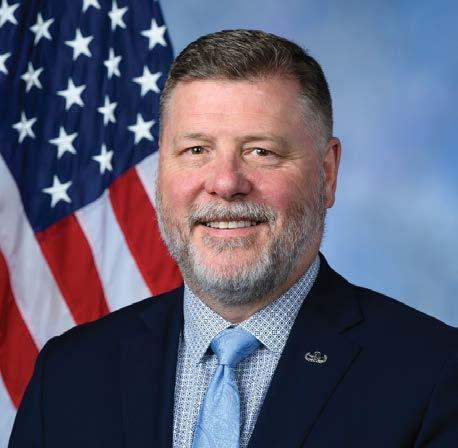
U.S.
With Trump discussing potential changes in foreign policy with Ukraine, Greenland, Panama, Canada and Mexico, Cotton will likely have outsized influence in shaping American policy.
“Keep in mind, the Intelligence chairman is a very big deal. It’s the Gang of Eight. So anytime the President incurs or starts a foreign incursion, it triggers a notification to Congress. Tom Cotton, as the part of the Gang of Eight, now he’s one of the ones that will be notified immediately before the action takes place,” said Howard. “It’s a pretty big role.”
The same can be said for First District Congressman Rick Crawford, R-Jonesboro. He was named chairman of the House Committee on Intelligence in mid-January replacing outgoing Chair U.S. Rep. Mike Turner, R-Ohio, who was removed from the position by Speaker of the House Mike Johnson.
“I am truly honored to be selected to lead the House Permanent Select Committee on Intelligence. I look forward to working with Speaker Johnson and the incoming Trump administration team to advance priorities that are important to Americans,” said Crawford.
“Since joining the committee in 2017, I have witnessed firsthand that abuse within our nation’s security apparatus has eroded trust in our institutions and compromised America’s ability to gather intelligence. As chairman, I will aggressively uphold our mandate to provide credible and robust oversight of the Intelligence Community’s funding and activities. Without aggressive oversight and vigorous protection of Americans’ Fourth Amendment rights, the IC is prone to give in to mission creep and skirt U.S. laws. In all our work, I pledge to preserve Americans’ constitutional rights even as we work to support the IC in doing everything required to collect indispensable information from our foreign adversaries,” added Crawford.
Also in the U.S. House of Representatives, U.S. Rep. Bruce Westerman, R-Hot Springs, retained his role as chairman of the House Committee on Natural Resources. This panel has
a broad range of interests, including forestry, fisheries and wildlife, interstate compacts, water supply, interior and Native American affairs, federal parklands, mineral and mining resources, and oil and pipeline projects.
The Trump administration has a plethora of agenda items that will focus on some of these areas, including the recent wildfires in California, drilling on federal lands and offshore waters, and restarting the Keystone Pipeline project. Already there has been some controversy around changes to the Buffalo River National Park cuts.
As bankers know, U.S. Rep. French Hill, R-Little Rock, was tapped to lead the House Financial Services Committee, a board that has broad jurisdiction over the nation’s banking system, credit cards, interest rates, and cryptocurrency, another area of interest where President Trump plans to be active.
Howard, who has worked in several roles for Democratic Congressmen, including Arkansas’ Mike Ross, said Hill’s background as a banker and his reputation in Congress as a collaborator, will make him very influential as a leader of this panel.
“Financial services impacts nearly every American in everything they do, from banking to lending to credit cards, etc. They kind of have the policy and the jurisdiction of writing legislation around those issues. And all of those have to go through his committee now,” said Howard.
WAS TAPPED TO LEAD THE
A BOARD THAT HAS BROAD JURISDICTION OVER THE NATION’S BANKING SYSTEM, CREDIT CARDS, INTEREST RATES, AND CRYPTOCURRENCY.
“The Republicans have campaigned on maintaining regular order, so he’s going to have an influence on pretty much everything related to the financial system that you can think of, including cryptocurrency and Bitcoin legislation,” added Howard. “That’s something Elon Musk and Donald Trump are very interested in.
“French Hill is a very serious legislator, very deliberate. He’s not one to grab headlines a lot. He puts his nose down, he works hard, and we worked with him a lot when I was chief of staff to Congresswoman Stephanie Murphy, a Democrat out of Florida. We did a lot of work together on the Entrepreneur’s Caucus trying to pave the way for small business owners and entrepreneurs to grow their businesses and to start one,” said Howard. “He is a very collaborative leader.”
U.S. Rep. Steve Womack, R-Rogers, was reappointed as chairman of the powerful Transportation, Housing and Urban Development, and Related Agencies (THUD) Subcommittee of the House Appropriations Committee. Womack will also continue to serve on the Defense and Financial Services and General Government (FSGG) Subcommittees during the 119th Congress.
“It’s been an honor to serve on the Appropriations Committee, particularly as chairman of the subcommittee that delivers the most for Arkansans. Drawing on my experience as a mayor, I understand how THUD’s jurisdiction impacts every American’s safety, economic opportunity, and quality of life. My service on Defense and FSGG allows me to strengthen our national defense and financial systems. My continued focus remains set on fiscal responsibility and securing wins for Third District Arkansans,” said Womack.


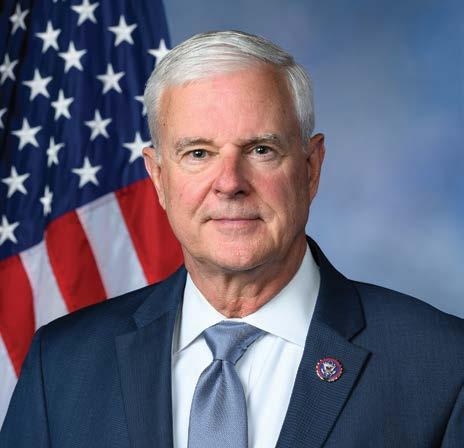

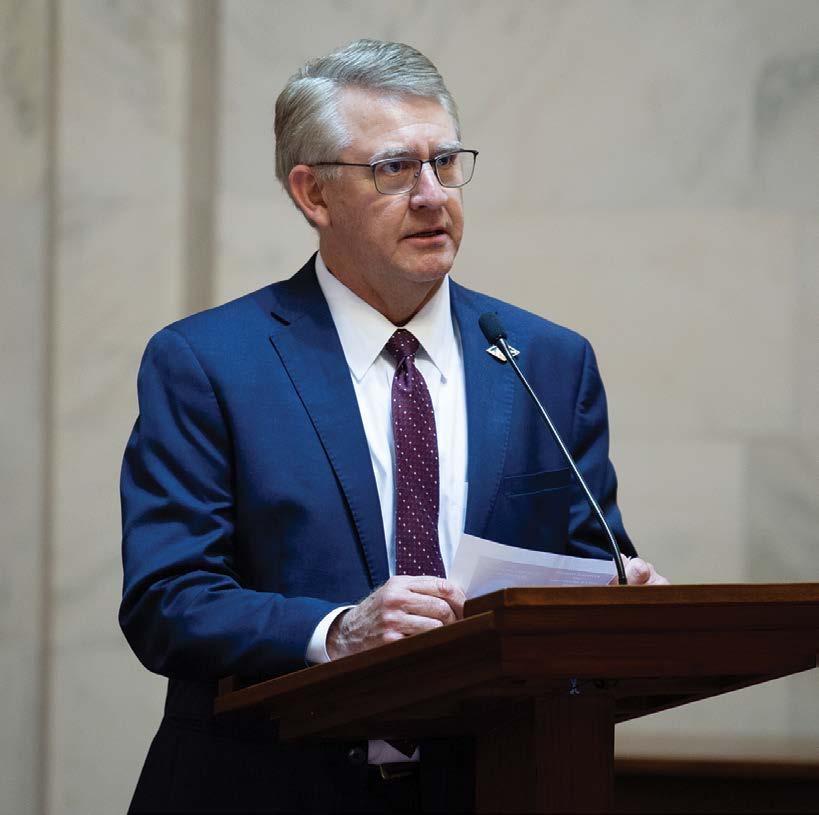
Senator Ricky Hill of Cabot represents District 11, which includes parts of Lonoke and Pulaski County. He was first elected to the Arkansas State Senate in 2018.
He is the chair of the Senate Transportation, Technology and Legislative Affairs Committee, which oversees a wide range of issues at the state capitol. He is also a member of the Senate Public Health, Welfare and Labor Committee, the Joint Performance Review Committee, the Senate Efficiency Committee, the Joint Budget Committee and the Arkansas Legislative Council.
“My banking background helps me a lot because I’m actually pretty financially savvy on how to do things and how to look at things internally, not just look at a number. I like to see how they got the numbers, see how they got the figures, and what they’re trying to come up with and what we’re trying to accomplish,” said Hill.
Hill grew up in rural Lonoke County on his parents’ farm. He helped with the farming and the family’s residential construction business. He graduated from Cabot High School and earned a
“My banking background helps me a lot ... I like to see how they got the numbers, see how they got the figures, and what they’re trying to come up with and what we’re trying to accomplish.”
Master’s Degree in Agriculture Business and Economics from Arkansas State University in Jonesboro.
As a young man, he joined the Professional Rodeo Cowboys Association and competed on the professional rodeo circuit as a professional bull rider for four years. During that time, he married his wife, Cynthia, who was a professional barrel racer. Their son, Glenn, is a lieutenant and aviator in the U.S. Navy, and their daughter, Julie, is an attorney in Little Rock.
After their rodeo careers, the Hills returned to Cabot. He was hired by SF Services and was the company’s youngest general manager. For 10 years, he managed three stores in central Arkansas before moving into banking. He now is an Executive Vice President with Bank OZK, and he continues to operate his family farm.
Hill thinks good days are on the horizon for banks.
“The long-range picture right now with banking is really good. It’s a little rocky right now because of some uncertainty with some of the federal regulations, but we’re pretty sure that there’s going to be some relief. That will make banking a lot easier, a lot friendlier,” he said.

R-CROSSETT
“I
think bankers are subject matter experts in many different areas ... It helps to know how legislation meets Arkansas business, men and women, where the rubber meets the road and how it impacts those businesses.”

Rep. Howard M. Beaty, Jr. is serving his third term in the Arkansas House and serves as the House Majority Leader in the 95th General Assembly. Hailing from Crossett, he represents District 95 which includes Ashley and Chicot counties.
For the 95th General Assembly, Rep. Beaty serves on the House Judiciary Committee, the House State Agencies and Governmental Affairs Committee, and the Joint Performance Review Committee. He is also the House Chair of the Arkansas Forestry Caucus.
Beaty has over 30+ years of experience in banking and economic development and has served as President of two Arkansas state-chartered banks. He holds an accounting degree from Louisiana Tech University.
Beaty said his banking background has helped a lot with legislative affairs.
“I think bankers are subject matter experts in many different areas, many different businesses, and I think that’s displayed well
here at the legislature. It helps to know how legislation meets Arkansas businessmen and women, where the rubber meets the road and how it impacts those businesses,” he said.
While many banking issues are affected at the federal level, there are still plenty of bills at the state level that can help or hinder financial institutions. Beaty said he keeps an eye out for legislation that can have an adverse or helpful impact on the state’s banks.
“The importance that Susannah Marshall [State Bank Commissioner] and the state bank department, the role that they play in advocating for state-chartered institutions and to help make sense of some of the rules and regulations that come out of Washington that filter down to small banks is very helpful,” said Beaty.
“To understand that we’re held accountable to the same rules and regulations and laws whether we’re a half billion institution or a billion dollar or a $20 billion institution - those same regulations apply. We get a little bit of break, but not many, so that’s an important part there. You got a couple of bankers up here, but we could do with a few more bankers,” he added.

by Susannah Marshall
The 2025 Arkansas Legislative Session will certainly produce proposals and ultimately new laws that may impact the financial services industries within the state. The state’s financial regulators have submitted proposed legislation that seeks to enhance financial services oversight in Arkansas.
The following is a brief summary of the legislative proposals for 2025 submitted by the Arkansas State Bank Department (Bank Department) and the Arkansas Securities Department (Securities Department) that relate to the financial services industries in Arkansas.
In furtherance of Act 475 of 2023, the Department of Financial Services is created for the purpose of coordinating administrative functions among the State Bank Department and State Securities Department in order to streamline the operation and administration of financial services functions.
The creation of the Department of Financial Services is intended to house the State Bank Department and State Securities Department. The creation of the Department of Financial Services is not intended to, as a result of this bill:
• Alter the structure, operations, or authority of the State Bank Department or State Securities Department.
• Create new positions or alter existing classifications within the State Bank Department or State Securities Departments; or
• Increase the size, scope, or expenditures of the State Bank Department or State Securities Department.
The Department of Financial Services shall be a division of the Department of Commerce and consist of the State Bank Department and the State Securities Department, and the Bank Commissioner shall serve as the Director of the Department of Financial Services.
The Bank Department submitted legislation that would amend, reorganize, update, and correct the Arkansas Trust Institutions Act of 1997 (codified at A.C.A. § 23-51-101 et seq.). The Arkansas Trust Institutions Act of 1997 (“Act”) was based on a model law developed by the Conference of State Bank Supervisors (“CSBS”), a national association representing bank departments for all U.S. States and Territories. Except for the repeal of sections 200-211 by Act 1031 of 2005 (“The Arkansas Trust”), there have been no changes to the Act since its adoption. Currently, there is only one Arkansas-chartered state trust institution in the state that operates under the Act. The basis of this legislation is that the Act is out of date, internally inconsistent, and was poorly organized with 199 sections of code that are not organized into subchapters or by topic.
The Bank Department’s legislation reorganizes the Act by creating twelve subchapters organized by topic, correcting internal inconsistencies, making updates where appropriate, clarifying language, and adding sections regarding representative trust offices, which were provided for in the CSBS model law but omitted when the Act was adopted. The proposed changes will not reduce or restrict the existing trust institution’s operations, increase fees, or require new permits or licenses for existing business. Further, the prior Trust Institutions Act did not provide a method for trust institutions to form representative trust offices even though they were referenced in the Act and were provided in the model Act. The agency incorporated language from the model act primarily into Sections 23-51-802 and 23-51-803 of the legislation to allow trust institutions to form representative trust offices.
A representative trust office is an office authorized by the Bank Commissioner to engage in business ancillary to the trust business. Examples of these activities include advertising, marketing, or soliciting trust business (but not accepting fiduciary appointments), answering customer questions, and providing account information to existing clients. Representative trust offices cannot act as a fiduciary or conduct fiduciary activities. These activities must be performed at a trust institution’s primary or branch offices.
The Securities Department submitted legislation that proposes amendments to the Fair Mortgage Lending Act. These amendments are primarily focused on Prudential Standards requirements and Data Security requirements. The proposal regarding Prudential Standards is necessary to ensure non-bank institutions remain healthy and well-managed through all economic cycles by focusing on financial condition and corporate governance; comprehensive prudential standards for non-bank mortgage servicers have been publicly called
SUBMITTED LEGISLATION THAT PROPOSES AMENDMENTS TO THE FAIR MORTGAGE LENDING ACT. THESE AMENDMENTS ARE PRIMARILY FOCUSED ON PRUDENTIAL STANDARDS REQUIREMENTS AND DATA SECURITY REQUIREMENTS.
for since 2014. The proposal regarding Data Security leverages the Federal Trade Commission’s (FTC) Safeguards Rule which establishes a robust framework for non-bank financial institutions to mitigate cyber threats, prevent data breaches, and uphold the integrity of the financial system.
The Prudential Standards focus on two main areas: financial condition, i.e., capital and liquidity, and corporate governance, i.e., board of directors, internal and external audits. Further, the standards:
• Align with existing federal minimum eligibility requirements, wherever practical, to minimize regulatory burden for servicers.
• Apply to servicers that service at least 2,000 loans and operate in two or more states and cover both agency and non-agency servicing.
• They do not apply to:
a) small servicers that meet a de minimis cutoff
b) not-for-profit mortgage servicers; and
c) housing agencies
The standards provide state regulators with flexibility to increase requirements for high-risk servicers or even suspend the requirements in times of economic, societal, or environmental volatility.
The Data Security requirements would allow the Securities Department to examine and enforce data security standards. Adopting these requirements imposes minimal additional compliance burden on nonbank licensees since the FTC’s Safeguards Rule currently applies to the licensee. This alignment ensures a streamlined approach to data security regulations and facilitates smoother implementation for these nonbank institutions.
• Non-banks should be subject to a common set of data security standards, enforceable by state regulators.
• The model law serves as a comprehensive framework, setting non-bank data security.
• The model law relies heavily on the FTC Safeguards Rule to leverage existing federal standards to ensure the protection of sensitive information and reduce regulatory burden.
• Outside of the largest non-banks, state regulators are often the only regulator enforcing data security measures.
The Securities Department also proposed amendments to the Uniform Money Services Act, primarily regarding Bitcoin Kiosks and Data Security requirements. The proposal regarding Bitcoin Kiosks is to strengthen existing requirements and implement additional disclosures for operators of Bitcoin Kiosks. The proposal regarding Data Security is consistent as detailed above and is necessary in order to also apply to entities covered by the existing Uniform Money Services Act.
The Securities Department is aware of increased risks associated with Bitcoin Kiosks and the agency’s proposed legislation that would help to better protect consumers in Arkansas while not impeding the legitimate operations of Bitcoin Kiosks. These additional proposed requirements include:
• Disclosures regarding virtual currency, information regarding the transaction.
• A maximum daily limit of $2,000 for a new customer; and $5,000 for an existing customer.
• A maximum fee of $5.00 or 15% of the transaction.
• Allow a new customer to cancel a transaction and receive a full refund for any fraudulent transaction that occurred within 72 hours of the customer registering.
SECURITIES DEPARTMENT IS AWARE OF INCREASED RISKS ASSOCIATED WITH BITCOIN KIOSKS AND THE AGENCY’S PROPOSED LEGISLATION THAT WOULD HELP TO BETTER PROTECT CONSUMERS IN ARKANSAS WHILE NOT IMPEDING THE LEGITIMATE OPERATIONS OF BITCOIN KIOSKS.
PROPOSED CHANGES WILL FACILITATE GREATER OPPORTUNITIES FOR ARKANSAS RESIDENTS TO INVEST IN LOCAL BUSINESSES AND WILL ENCOURAGE RESPONSIBLE AND COMPETITIVE INTRASTATE CAPITAL FORMATION ...
Lastly. the Securities Department proposed amendments to the Arkansas Securities Act which would create the “Invest Arkansas Exemption” from securities registration. The proposed exemption would eliminate burdensome requirements from an existing exemption for intrastate securities’ offerings, increase the total investment amount of the offering, and increase the amount a non-accredited investor could invest in the offering. These proposed changes to the existing exemption will facilitate greater opportunities for Arkansas residents to invest in local businesses and will encourage responsible and competitive intrastate capital formation by increasing financial resource opportunities to businesses that might not otherwise have access to capital.
The primary points related to this exemption are:
• The issuer of the security shall be a for-profit business entity formed under Arkansas law and registered with the Arkansas Secretary of State.
• The sum of total investment shall not exceed $10 million. This is an increase from the previous amount of $1 million.
• The maximum amount of investment from any single non-accredited investor shall not exceed $100,000. This is an increase from $5,000.
• The issuer will still need to file a proof of exemption with the Arkansas Securities Department that supplies information about the offering and includes the offering documents for review.


by Tim Schenk KBA General Counsel
In November, testifying before the House Financial Services Committee, representatives from the OCC, FDIC and Federal Reserve testified that there were no plans to finalize major rulemakings until 2025, when President Trump will likely appoint new leaders to the FDIC, OCC and CFPB. Notably absent from the list of agencies committed to “put the pen down” was the CFPB.
The American Bankers Association and others encouraged the CFPB to make the same commitment as the other prudential regulators; however, those calls fell on deaf ears as Director Rohit Chopra continued on from his unfettered bully pulpit. In what may not be his last move, but one that certainly defied “putting the pen down,” Director Chopra and the CFPB issued a final rule that caps overdraft fees at five dollars without an APR disclosure.
Under the final rule, the CFPB plans to reclassify overdraft fees as loans subject to interest rate disclosures under the Truth in Lending Act. According to the CFPB, the rule “would apply only to the largest banks and credit unions with more than $10 billion of assets, impacting roughly 175 financial institutions.” And therein lies the rule’s fatal flaw.
It’s important to recognize the other agencies for following the tradition of “putting the pen down” when new leadership is imminent. The reasoning is simple: why saddle your successor with Congressional Review Act challenges, lawsuits, and flawed rules that you won’t be around to defend or manage? Director Chopra, however, seems unconcerned with this precedent—or with the consumers he was tasked to serve, based on his track record. Why, then, should he worry about his successor? But I digress.
Looking at historical precedence, let’s consider Dodd-Frank. It’s well-known
that Dodd-Frank doesn’t just impact banks with over $10 billion in assets. While direct rulemaking often targets these larger institutions, it’s nearly impossible to find a community bank in the United States that hasn’t felt the ripple effects of such regulations. If a neighboring bank is forced to cap overdraft fees at $5, wouldn’t your smaller bank also feel pressured to match that rate to remain competitive? Most would agree. This rule is clearly a backdoor strategy for the CFPB to extend its control over all banks, regardless of size. In reality, this rule impacts far more than the 175 institutions it claims to target and places every bank squarely in the CFPB’s crosshairs during the waning weeks of its current administration.
The final rule offers three options for banks to comply with this regulatory burden: 1) cap overdraft fees at $5; 2) implement a “break-even cost analysis” to justify fees; or 3) disclose overdraft fees as loans under the terms of Regulation Z.
The first option—dropping fees to $5—might seem like the “safe” choice. In theory, it shields banks from further scrutiny. However, in practice, it could lead to financial losses, force banks to reduce customer products and services, or even eliminate overdraft programs altogether. While it may keep you compliant, the long-term impact on profitability and customer offerings is far from secure.
The second option proposed by the CFPB is the so-called “breakeven cost analysis.” While I don’t claim to know everything, I did learn a few fundamentals in school—lessons that may not have been in textbooks but hold true nonetheless. For example: “Businesses have to make a profit to survive; if it doesn’t make money, it doesn’t make sense.” Or, “You get what you pay for.” These basic principles seem to have been overlooked in the CFPB’s proposal. While I may not have attended Harvard like Director Chopra, it’s clear we received vastly different educations. I was taught that profitability is a basic requirement for any business endeavor. Chopra, it seems, was taught that as long as you can break even, it’s acceptable.
But let’s be honest—how does a breakeven approach make any sense? How does it account for losses from unpaid overdrafts, fraud, or even administrative costs? Isn’t “break-even” a constantly moving target, given the unpredictable nature of these factors? Calculating such a figure is not only impractical but likely impossible. It’s an option that feels more like an illconceived “out” for the CFPB—essentially saying, “go ahead and try to charge more if you dare,” without providing clear or realistic guidance. In short, it’s nonsensical.
Finally, the third jewel in Chopra’s crown of regulatory overreach concerns disclosure terms. This isn’t as simple as stating that the overdraft fee is $10, $15, or $20. Instead, banks must meet the complex and burdensome requirements of Regulation Z. Anyone who recalls the arduous process of implementing TRID will understand that this is, at best, a stressful and overly complicated mandate—if not an entirely impossible one.
Before Chopra’s outgoing rule was finalized, over 9,000 comments were submitted, many of which advocated for overdraft


safe harbors significantly higher than the proposed $5 cap. From March 25, 2021, to March 25, 2024—the month before the comment period closed—the CFPB received 2,874,457 complaints. Of these, a staggering 2,227,618 complaints, or approximately 77%, were related to credit reporting. This overwhelming majority highlights that consumer concerns are largely centered around credit reporting issues, not overdraft fees!
However, despite the high volume and concentration of complaints related to credit reporting, the KBA is not aware of any significant rulemaking action by the CFPB to address these issues. In contrast, complaints concerning checking and savings accounts totaled only 119,931 during the same period—a mere four percent (4%) of all consumer complaints. Moreover, these complaints were not specific to overdraft fees. This disparity raises an important question: Why prioritize passing a rule targeting overdraft fees when consumers are clearly more concerned about other issues? The answer seems clear—this rule is not truly about addressing consumer concerns.
It is also critical to recognize that overdraft is a service, not a requirement. By
reframing it as a punitive fee, the CFPB overlooks its role as a financial safety net for many consumers, further highlighting the disconnect between the rule and the realities of consumer needs.
The Washington Post said in an article, “For depositors, overdraft fees can be an expensive alternative to even worse options, such as payday loans or having their electricity shut off (and paying a reconnection fee to turn it back on). And “the best of bad alternatives” can also be sort of true for bankers, who must find some way to defray
the cost of providing what is basically an unsecured loan to people who are, as we’ve seen, often financially struggling and might be unable to repay the money. The fees also help pay for “free” checking (which costs banks quite a bit of money to provide).” What happens if banks decide enough is enough and discontinue overdraft? Who will win? Not consumers. But again, is it really about them?
In announcing the final rule, CFPB Director Chopra stated, “For far too long, the largest banks have exploited a legal loophole that has drained billions of dollars from Americans’ deposit accounts. The CFPB is cracking down on these excessive junk fees and requiring big banks to come clean about the interest rate they’re charging on overdraft loans.” However, overdraft fees have historically been transparent, and numerous studies indicate that consumers do not perceive these fees as excessive.
Perhaps it is time for Director Chopra to acknowledge that this rule reflects his personal agenda rather than the interests of the consumers he is tasked with protecting—a pattern that has been evident throughout his tenure.

by Jeff Peden | Culture Docs
Star Trek was introduced as a wildly popular TV series in 1966. Their opening line: “Space—the Final Frontier”.
As a leader in your bank, there is a vast, untapped frontier awaiting you inside your own organization: the riches of talent, experience, and creativity that exists within your own employees.
Too often, existing leadership mindsets and approaches have failed to realize the potential value the rest of the team is eager to offer. This creates its own set of problems, including:
• How to attract and retain a quality workforce
• Lack of Trust and Accountability
• Lack of Buy-In/Employee Engagement
• How to develop employee skills and confidence so they are highly successful executing their responsibilities
Most importantly, for you as bankers, is how to develop and retain the best talent for succession-planning.
If your goals include career bankers, then you must provide them an environment where they want to stay and grow; one that offers professional development, inclusion, and freedom from internal dysfunction and micromanagement.
Why not treat this new “frontier” as a strategic opportunity and take full advantage of it?
It has become increasingly evident over the last several years of working with clients that employee development, involvement, and retention are today’s best opportunities for long-term organizational improvement and success.
Here are three cost-effective and practical leadership strategies that have a proven track record to profoundly improve organizational results (without interfering with ongoing operations):
• TRAIN EVERYONE ON THE TEAM to a level of demonstrated competency where they no longer need daily supervision to be great at what they do (eliminates micro-management).
• MENTOR AND ENCOURAGE THEM to become effective problem-solvers and contribute their ideas on how to continuously improve organizational results. This creates employee engagement, makes them feel like they’re an important part of the team, and provides them the motivation to stick around and do their best work.
• ESTABLISH CLEAR BEHAVIORAL expectations that protect everyone from internal and external threats. This promotes feelings of safety, open communication, and dedication.
These three strategies predictably generate positive results because they provide what everyone wants from work: recognition, appreciation, respect, inclusion, participation in how the organization goes about achieving its objectives, and the opportunity to prove just how good they are if you’ll teach them how to be great at what they do, then get out of their way and let them demonstrate what superstars they can be.
EMPLOYEES PLAY THE MOST DECISIVE ROLE IN THE SUCCESS OF YOUR ORGANIZATION, AND THEY CAN CONTRIBUTE SIGNIFICANTLY TO YOUR SUCCESS STRATEGIES IF YOU WILL LET THEM.
Employees play the most decisive role in the success of your organization, and they can contribute significantly to your success strategies if you will let them.
Employees determine if the correct work gets done, whether it’s delivered successfully to your customers, and the quality of service your customer receives after the sale. Any one of these factors can increase or erode the success and the market value of your organization.
Turned off, employees do just enough to get by and get paid. Turned on, they became the game changers organizations have desperately sought for years.
Mentoring them to do their work so well that they no longer need supervision and empowering them to contribute their ideas transforms everything in your organization. This is the secret strategy any leader can use to drive performance and promote a healthy, vibrant, and enthusiastic work environment.
This style of leadership is personally rewarding, fulfilling, and gratifying. You benefit as the entire team advances and sustains improvements in attitude, morale, performance, commitment, and gratitude for the opportunity to participate and personally contribute to their organization’s success. Former clients report continued success and growth years after implementation.
The overall impact this has on the team is astonishing. People who have yearned their entire careers for the opportunity to be respected for what they know, and the opportunity to contribute to the success of their team find meaning and purpose in work and life. It influences employees becoming better parents, experiencing healthier relationships, and creating stronger communities.
And, as a leader, you now have everything in place to confidently pursue your next frontier.

Jeff Peden, international speaker and author, has inspired thousands of people for over three decades with great ideas on leadership, organizational effectiveness, employee engagement and customer delight. Jeff holds graduate degrees in Occupational Training and Development and in Counseling.

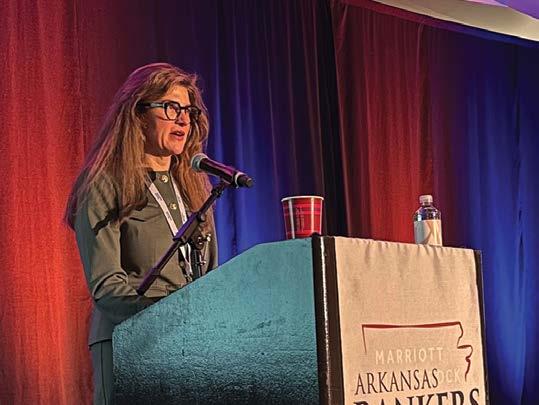
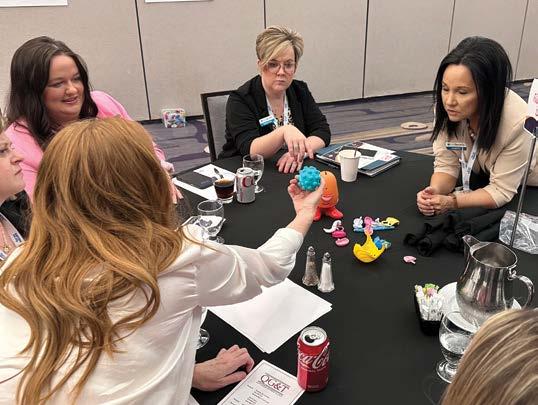
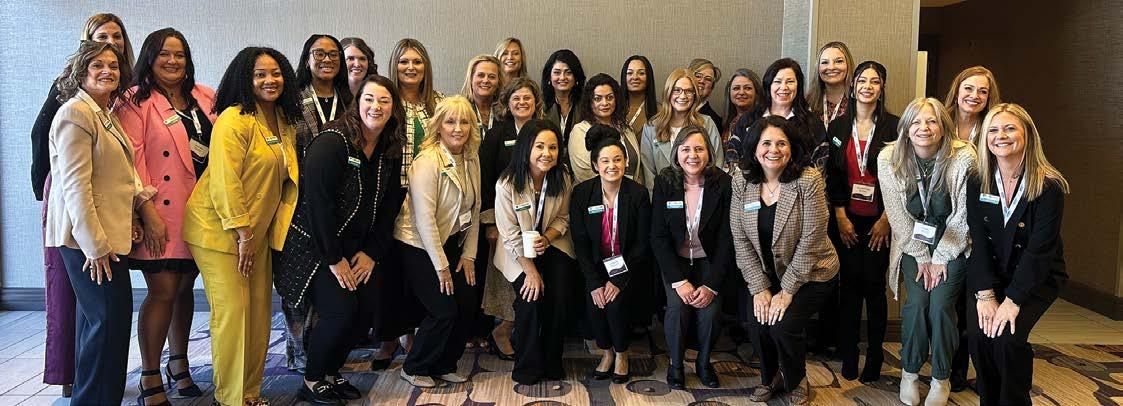

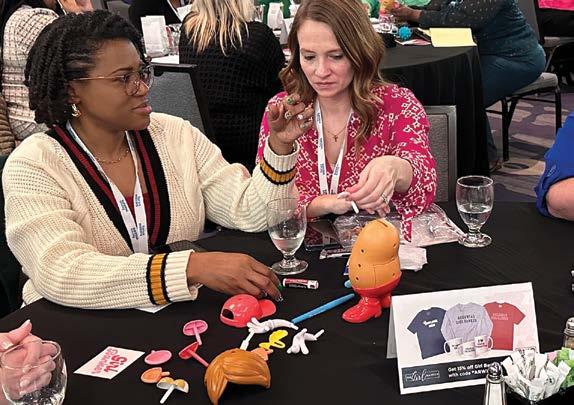

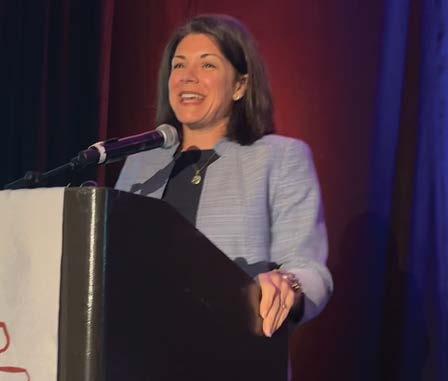
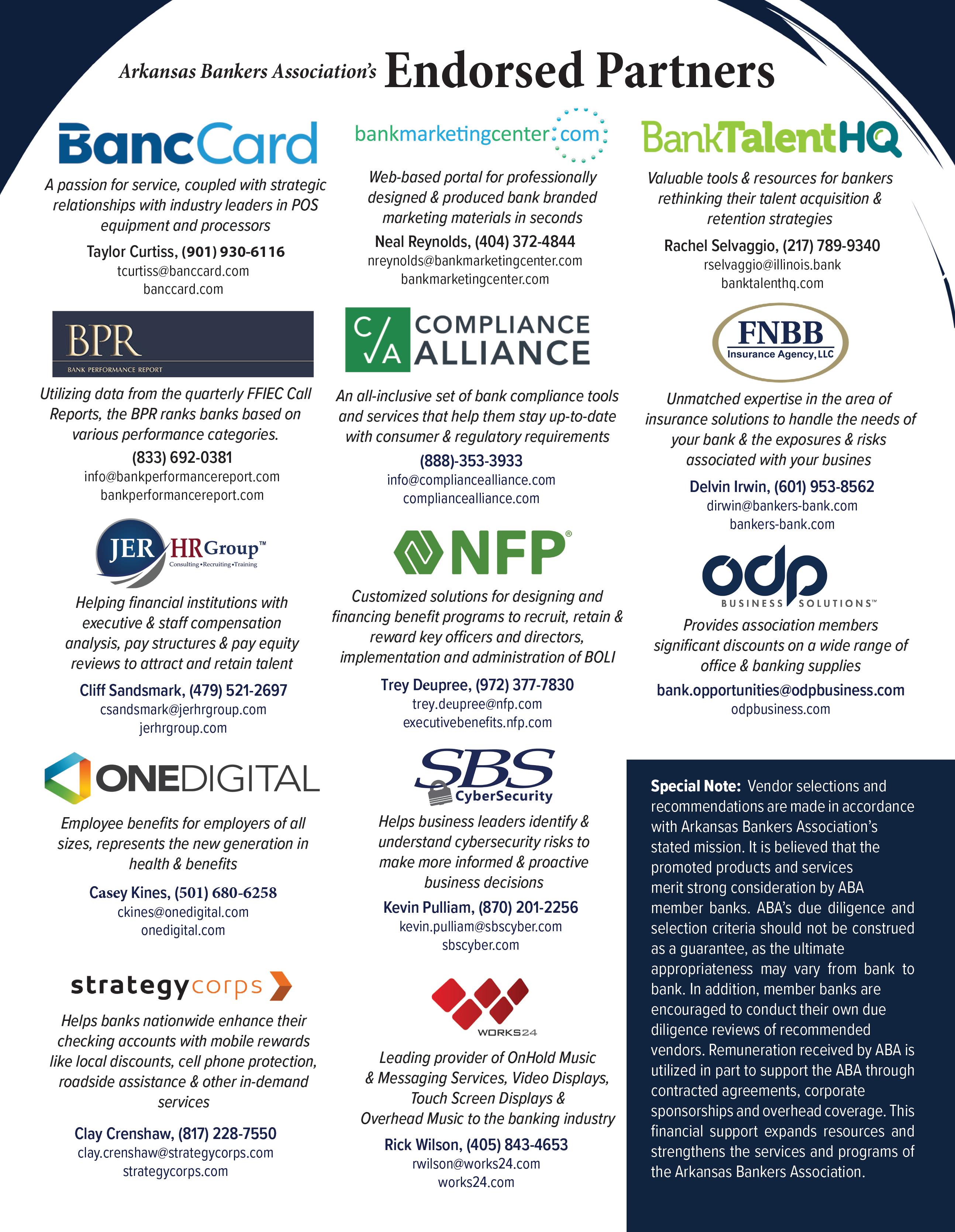
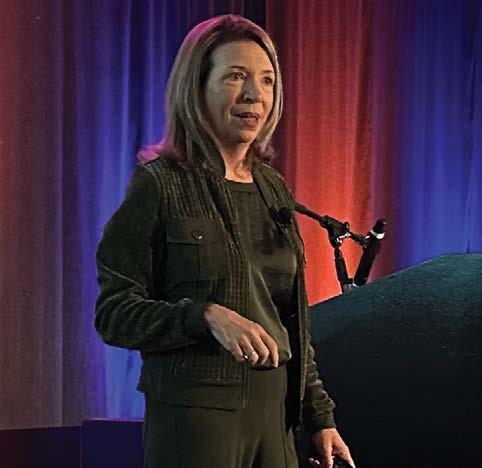
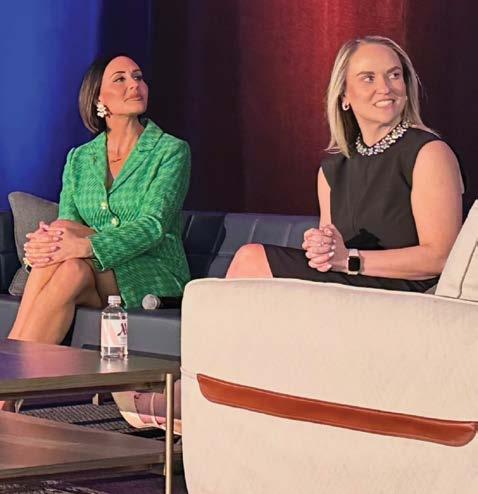

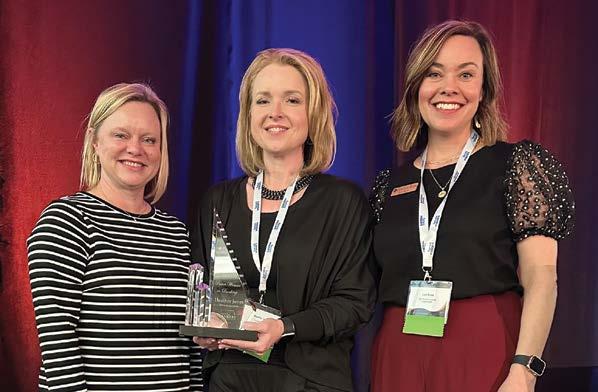



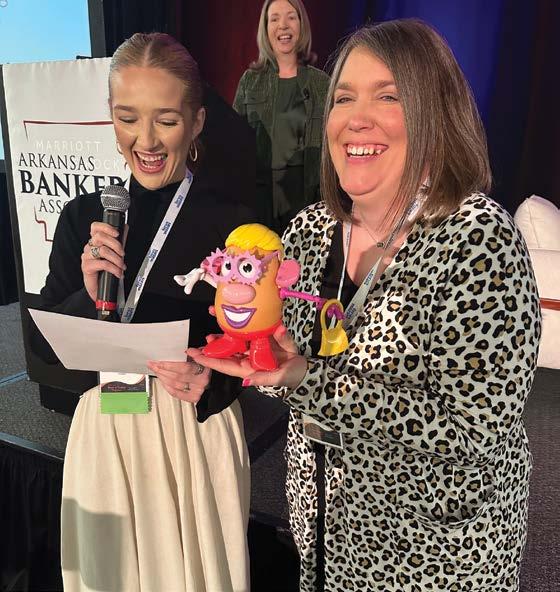
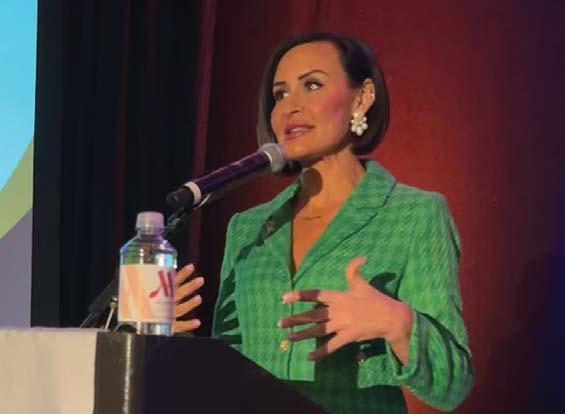
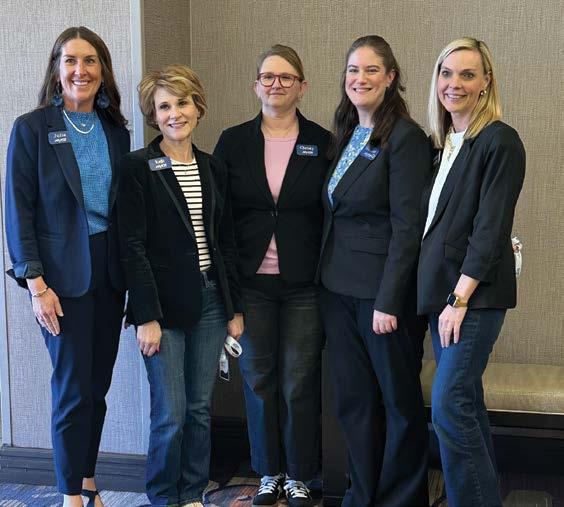
PHOTOS: Left to Right from Top: Speaker Vicki Kraai with Interaction Training; Rickie Smith, Heather Jones, Lori Ross – Heather Jones is the 2025 Power Woman in Banking recipient, and Rickie Smith of Wright Lindsey Jennings sponsored the award; women from CS Bank presenting their Mrs. Potato Head; Kirsten Sutton and Gretchen Conger, Chief of Staff, Office of the Governor for State of Arkansas during the panel discussion; First Security table working on their Mrs. Potato Head creation; speaker Kirsten Sutton, EVP, Congressional Relations; speaker Gene Page from SafeHaven Security Group; grand prize winner Jimena Balada Jaime with First Security, Darlene Goodwin and Jessica Eddleman of BancCard; Julie Shook, Kelli Winn, Christy Queary, Heather Kinyon, Jenny England from Arvest; and Gene Page giving his presentation on personal safety for women.



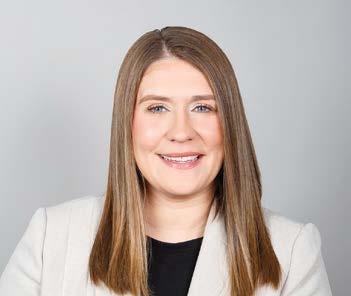

Farmers & Merchants Bank and The Bank of Fayetteville announced several promotions across the company.
Lydia Frizzell has been named General Counsel and Chief of Staff. Joining the bank in 2019, Frizzell brings extensive legal expertise and will oversee the legal department and policy development.
Frizzell was born and raised in a farming community in DeWitt. She initially dreamed of becoming an agriculture attorney after earning her law degree from the William H. Bowen School of Law at the University of Arkansas at Little Rock.
Leslie Self has been promoted to Chief Credit Officer. In her new role, Self will oversee loan policies and procedures to ensure overall regulatory compliance of the bank’s loan portfolio. A native of Conway County, Self earned a Bachelor of Science in Business Administration with a double major in Economics and Finance from Arkansas Tech University. She is also a graduate of the Southwest Graduate School of Banking at Southern Methodist University in Dallas.
Nikki Skinner is the new Human Resources Director. With
over 15 years of experience, Skinner will lead the human resources department, focusing on policy development, staff coordination, and compliance with state and federal regulations. She has served as a Clarendon School District board member and is involved in the Arkansas Society for Human Resources Management.
Melanie Watson has been promoted to Director of Special Projects. Watson is a Sheridan High School graduate with a Bachelor of Science in Public Administration from the University of Central Arkansas. With a strong background in advocacy, Watson has dedicated herself to years of advocating for workers’ rights and social justice issues, gaining extensive experience in politics across the country before settling in Stuttgart and starting a family.
Farmers and Merchants Bank, headquartered in Stuttgart, is a locally-owned community bank with 26 locations in Arkansas, including eight operating as The Bank of Fayetteville. With assets of more than $1.8 billion, Farmers and Merchants is the 12th largest bank chartered in Arkansas.
DD&F Consulting Group announced the appointment of Matt Reddin as Managing Principal. Reddin will lead DD&F’s Community Banking Division.
Reddin is a banking executive with more than two decades of leadership experience, having served as Chief Banking Officer, Chief Lending Officer, President of the Private Banking Group and Director of Community Bank Lending at two of Arkansas’ largest banks, Simmons First and Bank OZK.
“Matt is well respected in the financial services community, with extensive experience in expansion, acquisition, strategic planning, and regulatory affairs,” said Randy Dennis, President and Managing Partner at DD&F Consulting Group.
Reddin joined Little Rock-based DD&F Consulting Group in 2023.
“This is an exciting time in our industry, with both opportunities and challenges facing community banks and other financial service providers. DD&F has been helping clients prepare for and capitalize on opportunities in the market for more than 30 years. As a former client of DD&F, I’ve seen their unmatched expertise in financial and regulatory matters firsthand, and more importantly, the culture and values of the team,” said Reddin.
Batesville-based Citizens Bank has announced the promotion of Josh Baker as city president for the Central Arkansas market.
“We are excited to introduce Josh back into this market and are confident that he’s the right fit to help build on the momentum of Citizens Bank in Little Rock” said Micah Beard, EVP, Regional President of Citizens Bank. “With over 20 years of financial industry experience, 15 of which were spent in the Central Arkansas market, he is invaluable to our leadership team.”
Baker has served as city president in the Hot Springs market for the past five years. Now, he will lead both the Hot Springs and Little Rock teams and supervise lending in the central Arkansas region.
“I am honored to continue to serve the central Arkansas community in this new role and be part of a team so dedicated to the people we serve,” said Baker. “I look forward to building on the foundation that has made Citizens Bank such a trusted partner in Little Rock over the years.”
Baker holds a bachelor’s degree in business management from the University of Central Arkansas and is a graduate of the Barret School of Banking.
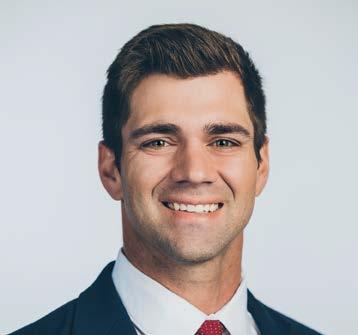
Stuttgart-based The Farmers & Merchants Bank and The Bank of Fayetteville have named Tyler Spoon the community president in the Fayetteville region. Spoon was a commercial loan officer before his promotion.
As community president, Spoon will oversee retail and lending operations in the Northwest Arkansas market. The former mortgage loan officer had more than 10 years of banking experience when he joined Farmers & Merchants in 2023, the release shows.
Spoon began his banking career in Fayetteville after retiring in 2018 from Major League Baseball, where he played for the Boston Red Sox for nearly three years.
He also was an Arkansas Razorback baseball player. Spoon joined The Bank of Fayetteville as a commercial loan officer in October 2023.
“I lived in many places across the country during my baseball career, and I feel so blessed to be able to work, live and help people in the greatest place on earth,” Spoon said. “Northwest Arkansas is an amazing, fast-growing community, and I’m honored to be a part of its growth.”
The Federal Reserve Bank of St. Louis has announced the following changes to its Little Rock Branch board of directors, effective January 2025.
Allison J.H. Thompson, president and CEO of the Economic Development Alliance for Jefferson County, Arkansas in Pine Bluff, Ark., has been elected board chair for 2025 by the Branch board of directors. She has served on the board since 2023.
Elizabeth Burns Anderson, senior vice president of Farmers Bank & Trust in Magnolia, Ark., has been appointed by the St. Louis Fed board of directors to a three-year term.
Also serving on the board are:
Christopher B. Hegi, president and CEO of First Financial
Bank in El Dorado, Ark., Denise Thomas, CEO of World Trade Center Arkansas, University of Arkansas, in Rogers, Ark.; and Darrin Williams, CEO of Southern Bancorp Inc. in Little Rock, Ark.
The Little Rock branch of the Federal Reserve Bank covers 63 of Arkansas’ 75 counties.
Members of the St. Louis Fed’s board of directors and those of its branch boards in Little Rock, Ark., Louisville, Ky., and Memphis, Tenn., are familiar with the economic and credit conditions of their respective regions.
Their observations — along with the economic data and information gathered and analyzed by St. Louis Fed staff — help ensure that conditions of Main Street America are represented in Federal Open Market Committee deliberations in Washington, D.C.
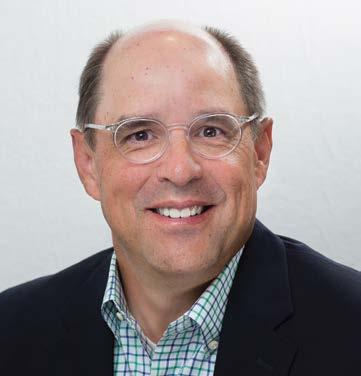

Phil Stevenson has been named Chairman of the Board of Union Bank. The position became vacated by the recent passing of David Maddox in August, 2024. Union Bank is privately held by Union Bankshares, Inc. (UBI) and headquartered in Mena, Ark.
Stevenson has been directly involved with Union Bank since 2008 as a director and shareholder/owner. His family has a long history with the bank. His father served as Chairman of both Union Bank and UBI until 2016. Stevenson is a native of Mena, graduating from there in 1984.
Stevenson brings with him 37 years of banking experience. He currently serves as an executive vice-president at Pinnacle Financial Partners in Memphis, where he will remain while also serving as Chairman of Union Bank. He earned his BSBA in finance and banking from the University of Arkansas in 1988.
“I’m very honored to be named Chairman of the Board of Union Bank. I’ve seen, first-hand, our
employees’ commitment to our customers and communities and I’m looking forward to assisting our teams in continuing this long legacy of service. My parents always made it a priority to us to be good stewards and our commitment to serve our communities, customers, and employees. Being involved at Union Bank allows me the opportunity to do all of that,” said Stevenson.
The board also appointed John Maddox to the UBI Board and into the role of secretary. Additionally, John Maddox has been appointed to the Board of Directors of Union Bankshares. Maddox, who has served as a director of Union Bank since 2007, is an attorney with the law firm of Maddox & Maddox in Mena. He also serves as a member of the Arkansas House of Representatives.
Union Bank is a $655 million dollar bank with nine locations located throughout west central Arkansas and the River Valley. The bank just opened a loan production office (LPO) in Russellville, Ark. earlier this year.
First Western Bank named Willie Cowgur as Bentonville market president on Tuesday (Jan. 21). Cowgur joined First Western Bank in April 2022 as senior vice president, business development officer. He previously worked for more than two decades in leadership roles at Walmart and Sam’s Club in Bentonville.
“Willie is passionate about seeing our community and our customers thrive, and his deep understanding of the unique market dynamics in Bentonville benefits our customers and our banking team at First Western,” said John Hampton, First Western chairman and CEO. “He has made a significant impact on our bank since joining us in 2022, and we are pleased to elevate his role to Market President.”
Cowgur graduated from the University of Arkansas with a bachelor’s degree in history. He is a native of Bentonville and has served on the Bentonville Public School Board since 2011.
“Our culture is relationship and service driven at First Western. We excel at helping businesses, families and organizations reach their dreams,” said Cowgur. “Leading First Western’s growth in my hometown is a dream come true. Bentonville’s economic growth, rich arts and cultural life, and natural beauty make this the best place in the world to live, work and play.”
First Western Bank, founded in 1910 in Booneville, Ark., has $702.655 million in assets and more than $591 million in deposits.
“OUR CULTURE IS RELATIONSHIP AND SERVICE DRIVEN AT FIRST WESTERN. WE EXCEL AT HELPING BUSINESSES, FAMILIES AND ORGANIZATIONS REACH THEIR DREAMS.”

Cross Bank, based in Wynne, has hired Jason Bland to serve as chief retail officer, overseeing staff throughout their 10 locations.
Bland comes to Cross Bank with more than 20 years of banking experience, most recently serving as the Tennessee Region Retail Sales Manager and private banking vice president for a Mississippi-based financial institution.
“We have been pleased to bring Jason on as the chief retail officer of Cross Bank,” said Cross Bank President and CEO David Dowd. “Along with overseeing bank performance, Jason has been tasked with
ensuring that our customers’ experience is aligned with our brand and core values. We know he will be an exceptional asset to us in this role.”
A Paragould native, Bland holds a bachelor of arts degree in education from Hendrix College and is a graduate of the Barret School of Banking in Memphis.
“Cross Bank has a significant and long-established presence in the Arkansas Delta region,” said Bland. “I am eager to work alongside our talented team to enhance customer experiences and further strengthen our position within each market we serve.”
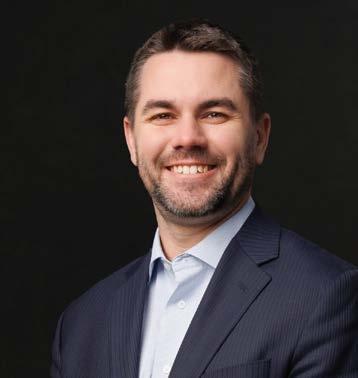
President
FNBC Bank has hired Gabe Roberts as community president for its Jonesboro market. Roberts has more than a decade of banking experience.
“Gabe’s leadership experience and strong ties to the Jonesboro community make him an excellent fit for this role,” said Executive Vice President and Chief Lending Officer Trent Brown. “His commitment to relationship-driven banking aligns perfectly with our mission, and we’re excited to have him leading our Jonesboro team.”
FNBC entered the Jonesboro market in 2018 under the leadership of the late Brad Snider.
“We remain deeply committed to investing in the Jonesboro community,” said Chad Hudson, president of FNBC Bank. “Gabe’s knowledge of the local market and passion for serving others will help us build on that foundation to grow even stronger to expand our reach.”
A graduate of Jonesboro High School, Roberts
was a vice president and commercial lender at another financial institution in Jonesboro prior to joining FNBC. Additionally, he has retail and credit analyst experience.
“I’m honored to join FNBC and lead the Jonesboro market,” said Roberts. “FNBC’s core values, community focus, and dedication to community banking are what drew me to this role. I look forward to working with our team and continuing to serve the people and businesses of Northeast Arkansas.”
Roberts holds a bachelor’s degree in finance, with an emphasis in banking and a minor in marketing, from Arkansas State University. He has also completed the Barrett School of Banking Commercial Lending Academy and its Graduate School of Banking. He is active in the Arkansas Bankers Association, having previously served as group one chairman and as a board member, and he is an Emerging Leaders Council Board Member.
“FNBC’S CORE VALUES, COMMUNITY FOCUS, AND DEDICATION TO COMMUNITY BANKING ARE WHAT DREW ME TO THIS ROLE. I LOOK FORWARD TO WORKING WITH OUR TEAM AND CONTINUING TO SERVE THE PEOPLE AND BUSINESSES OF NORTHEAST ARKANSAS.”

Stone Bank unveiled its remodeled Little Rock headquarters in January at an official ribbon cut-ting. The new location, at 12615 Chenal Parkway, in west Little Rock has undergone remodeling from corporate offices for over a year.
Stone Bank President and CEO Nick Roach, bank officials, and key project leaders cut a ribbon to officially open the bank facility.
“Remodeling this facility has been a long process and we are excited to provide a beautiful work environment for our employees and a new banking center for our customers,” said Roach.
The 39,000 square foot, three-story building, which will eventually house 115 employees, was built in 1990 and housed another Little Rock financial institution. The bank will occupy the first two floors with Shelter Insurance occupying the third floor.
Among the key features of the building:
• Bank branch
• 4-lane drive-thru plus ITM/ATM
• Community room with catering kitchen
• New entryway and vestibule
• New balconies on north and east sides
• Complete renovation of lobby
• New exterior windows on south side
• Replacement of interior walls with glass for increased natural light
• Installation of a “living wall” covered in live plants Stone Bank, which has roughly $700 million in assets, also has locations in Mountain View, Harrison, White Hall, DeWitt and Gillett.
“REMODELING THIS FACILITY HAS BEEN A LONG PROCESS AND WE ARE EXCITED TO PROVIDE A BEAUTIFUL WORK ENVIRONMENT FOR OUR EMPLOYEES AND A NEW BANKING CENTER FOR OUR CUSTOMERS.”
Rogers-based Generations Bank plans to relocate its headquarters to the Pinnacle Hills area of Rogers and open a branch there. Last year, commercial development firm Colliers Arkansas relocated its Rogers office to the three-story, 30,777-square-foot The Collection at Uptown at 3503 S. 55th St.
Walker Brothers, a men’s clothing retailer, will have an 8,500-square-foot store in the fully leased building. The bank will occupy about 16,000 square feet of the new building for the new branch and corporate office.
“We are excited to unveil our new corporate headquarters and branch location expectant to open in the third quarter of 2025,” said Jon Harrell, CEO and chairman of Generations Bank. “This move reflects our continuing commitment to serving the NWA community and providing our clients with the highest level of service and convenience.”
About 55 bank employees will work at the new branch and corporate office.
“Our new location has significantly enhanced the atmosphere in our office,” said Alan Cole, principal and executive vice president of Colliers Arkansas. “We’re excited to welcome Generations Bank as our co-tenant and neighbor, bringing
even more vitality to our growing community. The excitement surrounding The Collection at Uptown is truly remarkable.”
The new branch will be the bank’s second in Rogers and fifth in Northwest Arkansas, including branches in Bentonville, Fayetteville and Siloam Springs. Generations Bank’s existing corporate office is at 3704 Southern Hills Blvd. in Rogers.
“WE’RE EXCITED TO WELCOME GENERATIONS BANK AS OUR COTENANT AND NEIGHBOR, BRINGING EVEN MORE VITALITY TO OUR GROWING COMMUNITY. THE EXCITEMENT SURROUNDING THE COLLECTION AT UPTOWN IS TRULY REMARKABLE.”
Popular Bluff, Mo.-based Sterling Bank recently opened a three-story, full-service branch at 1001 S. Walton Blvd. in Bentonville. Scott Spencer, president and CEO of Sterling Bank, said this is the bank’s third Arkansas location, providing traditional banking services.
The bank also has locations in Rogers and Fayetteville. In February, the bank will open its 16th location in Little Rock, the release shows.
“We are very eager to serve the Bentonville community and participate in the growing Northwest Arkansas economy,” Spencer said. “We believe Sterling provides the finest staff and products available, and our customers will appreciate the local banking decisions Sterling offers.”
According to the bank’s press release, Arkansas President Johnathon Welch developed the leadership team. Phillip Roller will serve as vice president and Bentonville’s bank manager with support from Assistant Vice President Erica Goins, who will oversee branch operations.

The Sterling Community Board of Arkansas will support the new location along with the existing locations in Fayetteville and Rogers. Board members include Eric Arthur, Welch, Dan Cheek, Alan Cole, Daniel Ellis, Cory Scott, Holland Weaver, Jordan Patterson, Jay Robbins, Roller and Hillary Shipp.
As of Sept. 30, Sterling Bank’s assets were $1.42 billion, according to the Federal Deposit Insurance Corp. Sterling Bank is a subsidiary of Sterling Bancshares Inc. and operates 15 locations in three states: Arkansas, Illinois and Missouri.
The 275,000-square-foot Cox Business Convention Center in Tulsa will be renamed Arvest Convention Center after Fayetteville-chartered Arvest Bank reached a 10-year agreement for the naming rights.
The convention center at 100 Civic Center is the second large building in downtown Tulsa that Arvest has secured the naming rights to since November. The 32-floor, 288,776-square-foot Bank of America Center building at 15 W. Sixth St. will be renamed Arvest Tower.
Arvest reached the new agreement with the city of Tulsa and Oak View Group, the convention center’s manager. Tulsa Public Facilities Authority approved the name change on Thursday. The naming rights will become effective March 1.
“We’re very excited about this partnership and to be associated with a first-class venue that has served the city of Tulsa for more than 60 years,” said Kirk Hays, president of Arvest Bank – Tulsa region. “Arvest believes in supporting the people and organizations that make our city a better place. This facility plays a vital role in our community, and we’re proud to support its continued success.”
OVG Global Partnerships, Oak View Group’s sponsorship and naming rights division, reached the 10-year partnership on behalf of the city of Tulsa. OVG also manages the Fort Smith Convention Center.
“This partnership with Arvest Bank is an exciting milestone for the city of Tulsa and our convention center,” said Tulsa Mayor Monroe Nichols. “With Oak View Group’s management of the facility and Arvest’s deep commitment
“WITH OAK VIEW GROUP’S MANAGEMENT OF THE FACILITY AND ARVEST’S DEEP COMMITMENT TO OUR COMMUNITY, WE ARE CONFIDENT THAT THIS COLLABORATION WILL HELP US TAKE THE CONVENTION CENTER TO NEW HEIGHTS.”
to our community, we are confident that this collaboration will help us take the convention center to new heights. We look forward to seeing the positive impact this partnership will have on Tulsa, driving growth, and enhancing the experience for residents and visitors alike.”
Work on the new signage is underway and will be unveiled later.
The convention center, located in the Arena District, opened in 1964. According to an Arvest spokeswoman, it has the largest banquet space in Oklahoma, at 41,470 square feet.
